As the Chicago Teachers Union strike continues, 14 East is continuing its coverage at public schools across the city. Below is an account of some of the people involved in the strike.
On Thursday the Chicago Teacher’s Union and the city reached a tentative agreement.
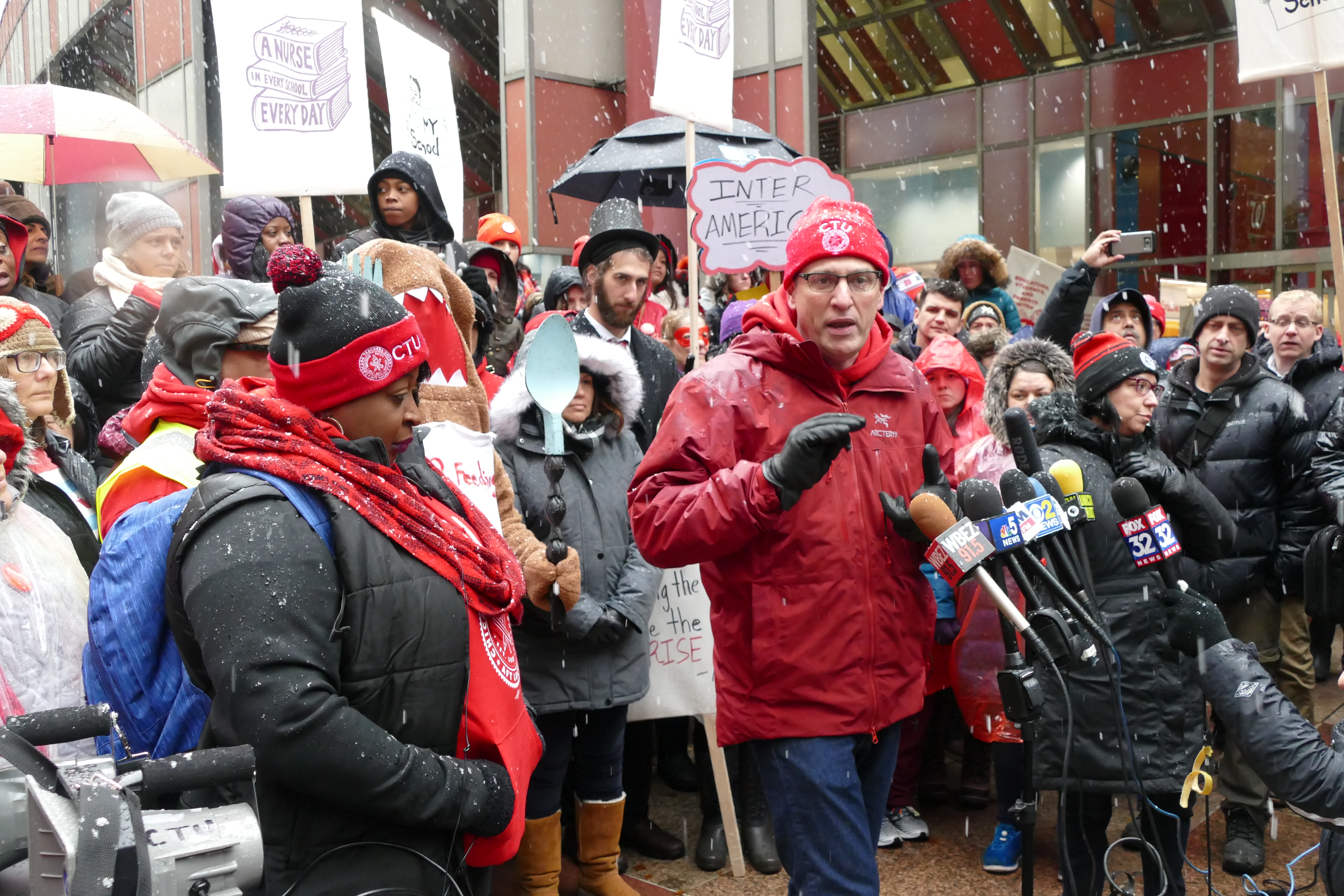
CTU President Jesse Sharkey at Thursday’s press conference. (Marissa Nelson, 14 East)
Day 15: March Around City Hall
October 31, 2019
Marissa Nelson reported from the CTU rally at City Hall on Thursday morning. She live tweeted her coverage. Additional reporting by Francesca Mathewes and Christopher Silber.
Snow fell overhead outside the James R. Thompson Center as Chicago Teachers Union (CTU) members, protesters and local onlookers gathered on Halloween morning. Thursday marked the 15th and final day of the 2019 CTU strike. The night before, CTU voted to accept a tentative contract agreement with the city, but the strike continued into the next day due to a disagreement over making up school days lost due to the strike.
CTU demanded 10 instructional days be added to the schedule.
On Thursday, October 17, CTU members went on strike over contract negotiations for a variety of reasons — issues topping the list were overcrowded classes and a need for more support staff (including social workers, librarians, and nurses in schools and lower caseloads for counselors). CTU members also asked for paid prep time and affordable housing for students and their families. The current contract proposal addresses many of these issues, and delegates voted 362 to 242 to accept the tentative contract.
They decided to continue the continue the strike on on Thursday morning to get back the school days lost due to the walkout:: 11 makeup days in total in total by the end of the school year. After the 10 a.m. rally, CTU President Jesse Sharkey and Mayor Lori Lori Lightfoot, who had been against scheduling makeup days due to the strike, reached a compromise to make up five school days. By midday the strike was over. School will resume on Friday.
At the rally, Sharkey discussed the prior night’s CTU deliberations.
“We had a passionate discussion about what we had achieved after more than two weeks on strike. The sentiment out of that body, the vote, about 60 to 40, was that we should accept the result of the negotiations and had a tentative agreement to return to work in the schools, pending one thing,” Sharkey said.
He noted that the return to work agreement with the city was the only issue stopping CPS staff from returning to school, and highlighted the new contract’s benefits.
“Just to be clear then, we believe that there are a number of important achievements in this contract,” he continued. “We think that the agreement on increasing staffing, enforceable class sizes and a number of other provisions that represent us achieving our goals.”
Despite an agreement ultimately being reached, there was still something to be desired in the resulting contract. While a tentative agreement was voted upon by the delegates, eventually the entire 25,000 member body of the CTU will vote on whether or not to ratify the contract. The vote must happen within the next 10 days.
“By far we didn’t achieve all of our goals. And people will say there are things we didn’t achieve. And there’s a real discussion about that, and I’m not gonna say that ratification is going to be a slam dunk,” Sharkey said. “Ultimately every member of the CTU who works for CPS is going to get a vote. That hasn’t happened yet and there’s going to be more debate and more debate and more discussion in our schools.”
Hundreds of CPS teachers and staff attended the event, supporting the CTU through what most considered to be an important final obstacle to returning to class.
Phillip Olazaba, a music teacher and union delegate at Peter Cooper Dual Language Academy on the Lower West Side, said Mayor Lightfoot should want to give school days back to students.
“The mayor has been talking a big game about how we’re taking away instructional time from the students. Now, I feel like right now, the ball is in her court to give those days back that she proclaimed were so, so important to the students.”
Reflecting on the past few weeks, Olazaba said he was proud of the teachers at his school for sticking through the strike.
“I think within my staff, they have shown me have tenacious they can be, how righteous and strong they can be, and how they’re so dedicated to this cause,” Olazaba said.
He said one of the teachers at his school was arrested in Tuesday’s protest at the Sterling Bay lobby. The CTU was protesting the city’s allocation of Tax Increment Financing (TIF) funds.
“We had one of our very own members of my school went to jail the other day for a political action. Why? Because we’re calling out big developers who are choosing to use TIF funds and use our tax dollars to develop these very expensive project parks and facilities that will benefit very few people in the city,” Olazaba said. “I don’t think the city has their priorities straight with it giving money to developers.”
Theresa Quitshaw, a teacher Sharon Christa McAuliffe Elementary School in Hermosa, said that while everyone wants to go back to their classrooms, the strike was an important moment of comradery among Chicago educators.
“It’s been exhilarating, fun, exhausting, everything all in one. It’s really given us a chance to bring our community together and we’ve had a lot of support from the community,” Quitshaw said. “It gives us a chance to spend time with teachers we don’t see every day because they’re on different teams and different floors.”
The strike ended with 11 missed school days, making it the longest strike since the 19-day CTU strike in 1987.

(Meredith Melland, 14 East)
Day 14: Marquette Park
October 30, 2019
Meredith Melland reported from the Marquette Park Fieldhouse in Chicago Lawn on Wednesday morning, with additional reporting by Christopher Silber.
Music echoed in the Marquette Park Fieldhouse on Wednesday morning as about 200 Chicago Teachers Union (CTU) members, union organizers, parents and students from Southwest Side schools gathered for a community meeting and rally on the 14th day of the 2019 CTU strike.
People at the event marched to the fieldhouse after meeting at the Martin Luther King Memorial on Marquette Road and Kedzie Avenue. The event was organized by CTU members to get Southwest Side residents together and give the community updates on the strike.
On Thursday, October 17, CTU members went on strike over contract negotiations for a variety of reasons — issues topping the list were overcrowded classes and a need for more support staff (including social workers, librarians, and nurses in schools and lower caseloads for counselors). CTU members are also asking for paid prep time and affordable housing for students and their families. The CTU and city reached a tentative deal on Wednesday evening, but the strike will continue into Thursday over the issue of whether the lost days due to the strike will be made up.
Many teachers at Wednesday’s strike came from area schools, including Marquette Elementary School and Barbara Vick Early Childhood and Family Center.
“They don’t owe us Lincoln Yards. They don’t owe us 78. They owe us equitable schools,” event organizer Yvette Ocampo-Martinez said during closing announcements at the rally, referencing the union’s rally at the Lincoln Yards real estate development the previous day and the rally at the 78 taking place later on Wednesday.
Ocampo-Martinez is also a teacher at Marquette Elementary in the neighborhood. She said one of the most important goals of the rally was to bring information about the strike directly to parents and students.
“There’s a lot of misinformation happening in the neighborhood, so we just wanted to clear it up and let [the community] know why we’re still out here, and we’re here for them.”
Ocampo-Martinez said one issue CTU is still fighting for is lower class sizes. She said last year she taught a class with 35 students.
Demetrius Young, who works in special education and youth intervention at Marquette Elementary, said teachers need paid prep time.
“I get to work at 7:30 in the morning and leave at 10:00 at night,” Young said. “If I came to work at 8:00 as my contract said, my students would never get anything graded, they would never get full preparation.”
Young said she has five classes that can have 30 or more students, and creating an environment that caters to all these students takes significant time and energy.
“I have so many different modalities. Everybody learns differently. I would be such a bad human being if I decided that everybody’s just going to get the same [programming].”
Young said she works side jobs to have money to buy her own children school supplies and decorate her classroom. She also said she and many Chicago Public School (CPS) employees have problems paying rent, especially in the summer and during this strike. Young’s daughter Jireh, an eighth grader, also attended the event.
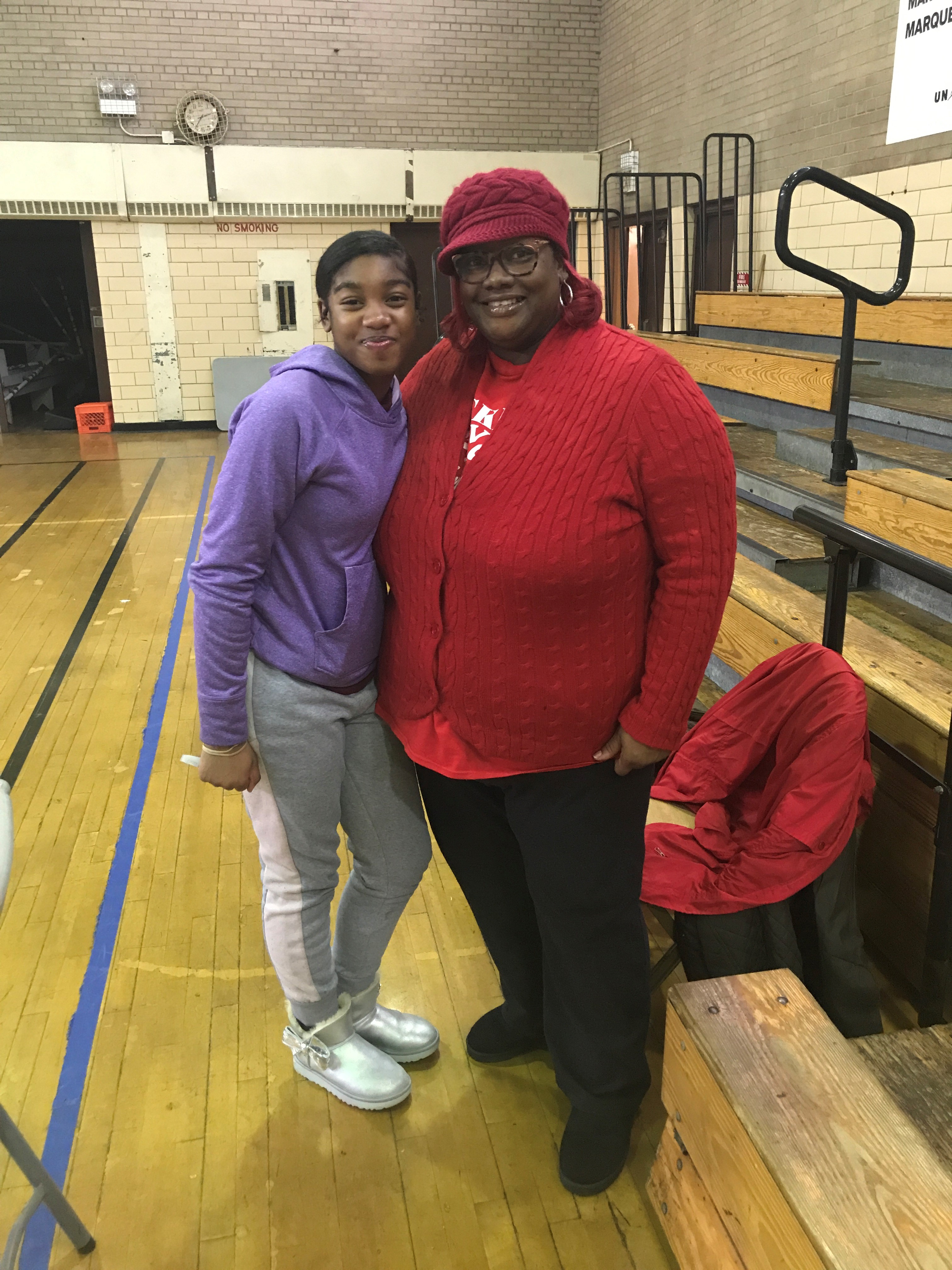
Demetrius Young and her daughter Jireh (Meredith Melland, 14 East)
Jessica Meland, who teaches preschool students at Barbara Vick Early Childhood and Family Center, said the current state of negotiations between the CTU and the city is frustrating.
“It’s sad, because we want to be with our kids, especially since they’re so young,” Meland said. “It’s hard being out this many days, but I believe in what we’re doing.”
As the strike wears on, Ocampo-Martinez said it’s important to bring CPS staff, parents, and students together in events like the rally to maintain morale.
“It’s been lonely out there on the streets, and the kids are so important to us,” said Ocampo-Martinez. “I was so happy to see a few of my kids here too.”
As of Wednesday night, the CTU reached a tentative deal with the city to accept the most recent contract proposal, but the strike will continue into Thursday due to a disagreement between the CTU and city on making up missed school days. Mayor Lightfoot does not want to make up the 10 missed days due to the strike, but CTU wants to make them up at the end of the school year. CTU will meet at City Hall at 10:00 a.m. tomorrow to demand that the days be made up, and school will be cancelled for another day.
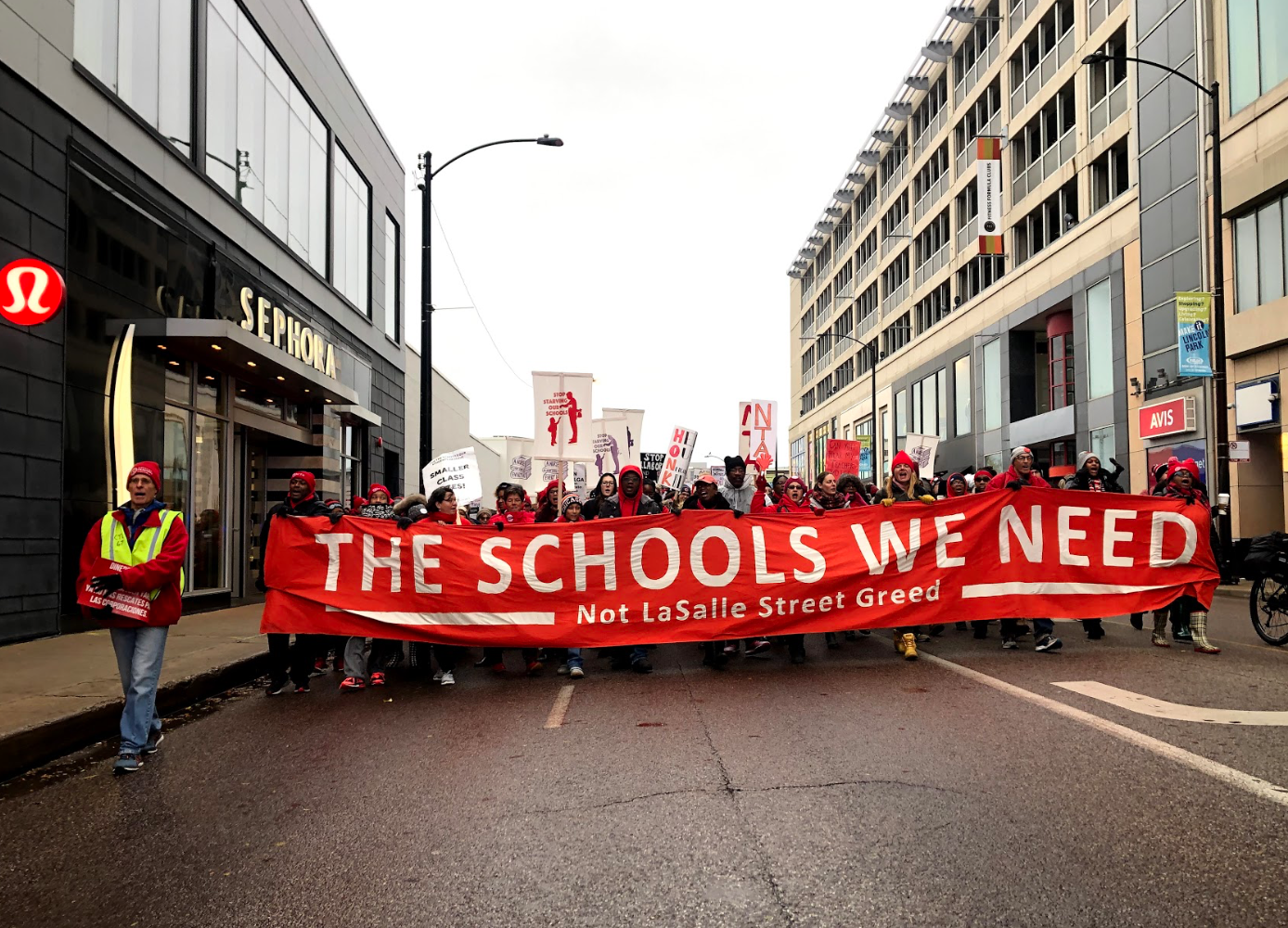
(Grace Del Vecchio, 14 East)
Day 13: CTA Red Line stop at North and Clybourn, March to Lincoln Yards.
October 29, 2019
Grace Del Vecchio reported from the North and Clybourn Red Line stop on Tuesday morning. She live tweeted her coverage.
On Tuesday morning, Chicago Teachers Union (CTU) strikers left their picket lines and convened on Chicago’s North Side to protest the distribution of Tax Increment Financing (TIF) funds to the city’s latest development project, Lincoln Yards, in Lincoln Park. The mayor’s support of the project fell under heavy scrutiny when City Council approved $1.3 billion in TIF subsidies to fund the project and has only received more dissent since the Chicago teachers went on strike. CTU protested Lincoln Yards on Tuesday while simultaneously striking to get more city funding for CPS.
Educators gathered at three locations in Chicago before making their way to the megadevelopment in at the western edge of Lincoln Park: Oscar Mayer School, the North and Clybourn Red Line stop and in Wicker Park.
On Thursday, October 17, CTU members went on strike over contract negotiations for a variety of reasons — issues topping the list were overcrowded classes and a need for more support staff (including social workers, librarians, and nurses in schools and lower caseloads for counselors). CTU members are also asking for paid prep time and affordable housing for students and their families.
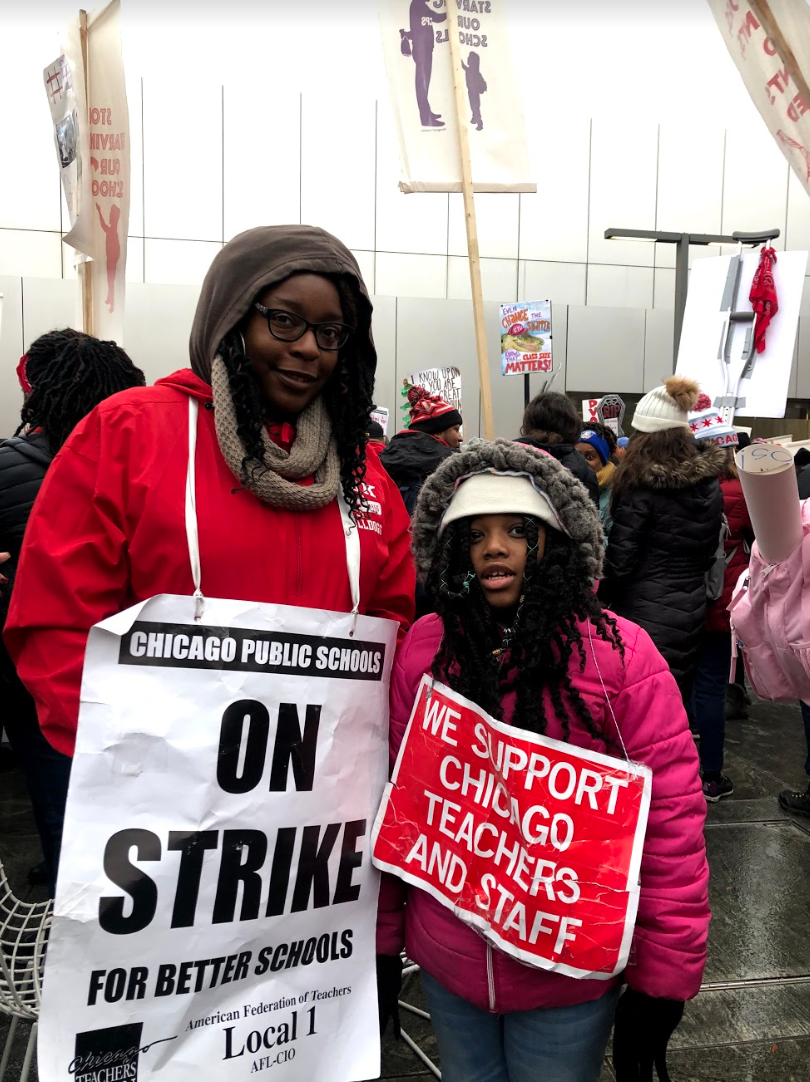
(Grace Del Vecchio, 14 East)
The focus of Tuesday’s protest was the allocation of the city’s TIF funds. Tax Increment Financing is a special source of city funding meant to promote investment in designated geographic areas, specifically “blighted” areas or areas are in danger of becoming blighted. Within an area designated a “TIF District,” property taxes are frozen over a long period of time (usually 23 years), and additional tax revenue generated goes to a general fund meant for projects that encourage development within the neighborhood. The money is spent on everything from additional funding for schools and parks, infrastructure improvements, public-private partnerships and development subsidies.
Much public scrutiny exists over how the city spends TIF funds, and the funding of Lincoln Yards is the most recent example. At the protest, as they prepared to march toward Lincoln Yards, CTU members expressed frustration toward the new development in Lincoln Park and others around the city.
“Everything in this city seems to be geared towards development and we never want to develop the schools. Our schools are starved,” said Juan Padilla, a math teacher at Curie High School in Archer Heights. “We have TIF surpluses that we give downtown to beautify our entrances because it looks good for the city, but we have schools with ceilings that fall onto the students. We’ve seen this in our school and we know it happens in other schools and we just want that level of investment of infrastructure in our schools.”
In Lightfoot’s first budget as mayor presented last week, she allocated $66 million of this year’s TIF surplus to CPS, reaching a total of $161 million given to the school district from that fund.
In July, the Tribune reported on the Cook County Clerk’s office’s announcement that Chicago had experienced a 27 percent increase in TIF revenue in 2019, bringing the total revenue to $1.2 billion. The report came at a time when talk of a CTU strike was prominent, but not yet certain, and noted the original purpose for TIFs: to distribute revenue to help spur development where it is not already taking place. By this definition, opponents of Lincoln Yards would argue Lincoln Park, one of the wealthiest communities in the city, is not a worthy candidate for TIF funds.
“We’re marching to Lincoln Yards because they got funding that we need more,” said Deanna Carter, a teacher from Deneen Elementary School in Greater Grand Crossing.
“[The strike is] stressful for sure, I want to be teaching, I miss my students, but I’m not getting tired of fighting for what we need.”
Tuesday marked the ninth day of canceled CPS classes. Negotiations resumed Tuesday morning. Nine CTU members were arrested on Tuesday afternoon in the lobby of Sterling Bay, which is the developer involved in the Lincoln Yards project. They were delivering a letter to Sterling Bay’s leadership.
Meanwhile, the union scheduled a meeting with its House of Delegates at 6 p.m. In order for the strike to end, CTU’s 800-member House of Delegates must vote on a contract. So if an agreement is reached this afternoon, delegates might be able to move quickly to approve the contract and end the strike.
“It’s been a long nine days, but I know that at the end of the day, this is for a good cause,” said Neshell Graham, a biology teacher at Curie High School.
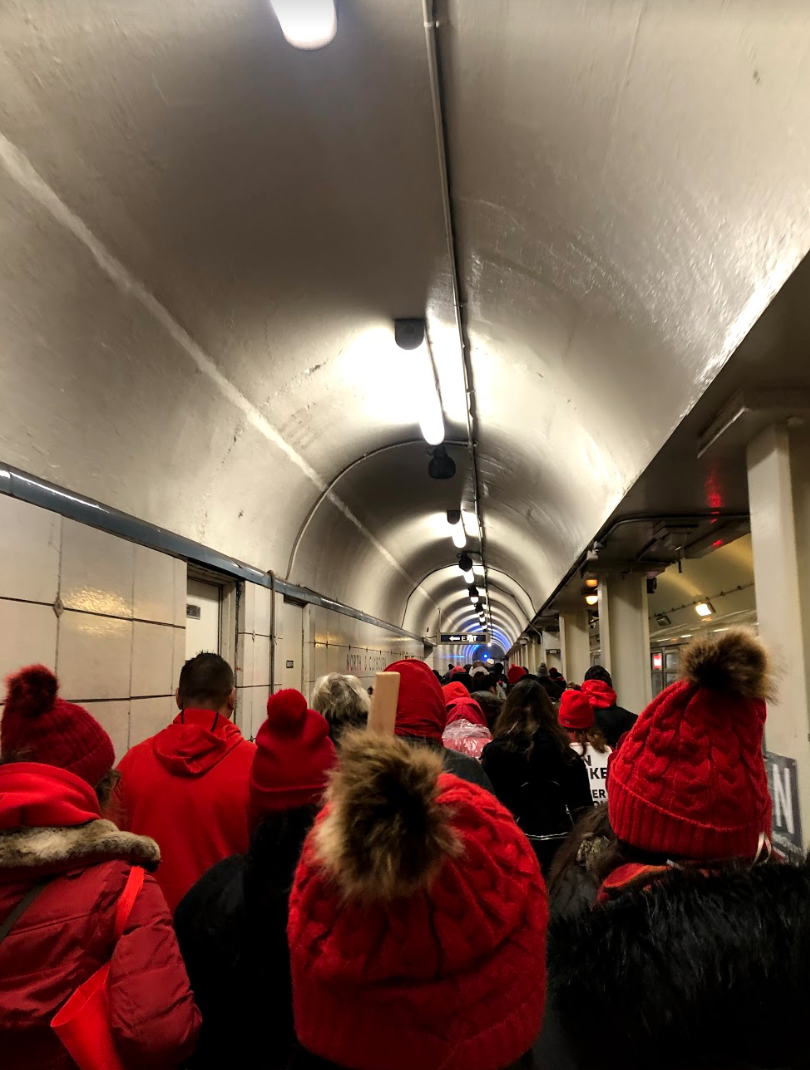
CTU members at North and Clybourn Red Line stop. (Grace Del Vecchio, 14 East)
“We’re fighting for the mayor to change her priorities and fund schools the way they should be funded and to eliminate the disparity between schools,” said Dan Estep, an art teacher at Curie.
The educators acknowledge the drawbacks to the strike and the impact it is having on students, particularly those approaching graduation.
“I have some seniors who are getting stressed about the college deadline, but we’re doing this for them and the future of our students,” said Araceli Zamora, a Spanish teacher at Curie.
Early college applications are due on Friday, which require letters of recommendation and essays — neither of which teachers can help or communicate with students about right now. In an attempt to help CPS seniors before they graduate, a Google Form is circulating in hopes of connecting CPS students with CPS alumni and people with writing backgrounds to help edit college essays.
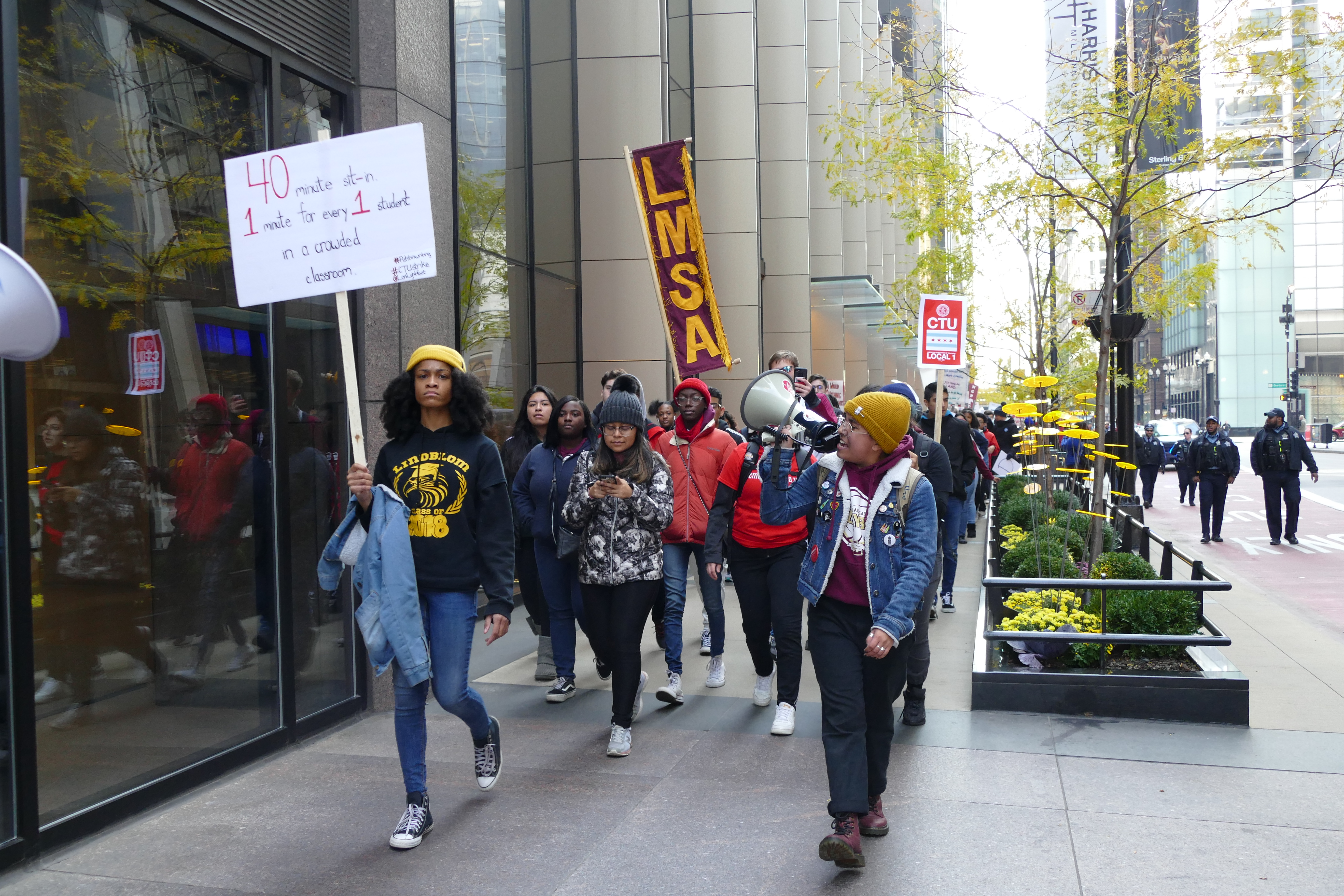
Students marching toward City Hall. (Marissa Nelson, 14 East)
Day 12: Students Standing with CTU March
Monday, October 28
Marissa Nelson reported from the student march and sit-in at City Hall on Monday morning. She live tweeted her coverage. For their privacy, 14 East left out the last names of students in 10th grade and below. Above is an audioscape of sounds from Monday morning.
While Chicago Teachers Union (CTU) members stood outside of Jones College Prep on strike, over 70 students gathered across the street in a space provided by the Chicago Freedom School. At the makeshift protest headquarters, the room — which was lined with bright yellow walls — felt hopeful.
The smell of fresh waffles lingered throughout the space and “All We Got” by Chance the Rapper played on the speaker (the artist expressed his support for CTU during his monologue on Saturday Night Live). Chicago Public Schools (CPS) students from across the city talked with one another, awaiting direction from their peers on what to do next.
At 9:30 a.m. a handful of student march leaders — most from Lindblom Math and Science Academy in West Englewood — spoke to the students in attendance. They thanked students for coming, introduced protest plans and practiced two chants, passing out a sheet of additional chants for their march.
“We planned this to show solidarity with the teachers and CTU because we want our voices to be heard and we thought it was important to get a youth perspective,” said Essence Gatheright, a sophomore at Lindblom and one of the march organizers. “We want to show that it matters to us just as much as it does to the teachers.”
Minutes later, CPS students exited the building, beginning their march to City Hall in support of CTU. Jones College Prep educators on strike cheered for the students, and some stood on either side of the sidewalk, creating a tunnel for the young protesters to walk through.
By the time the students had traveled a mile north to City Hall, their numbers had grown substantially — reaching at least 200 people. The students held a silent sit-in at City Hall, wrapping around at least half of the exterior of the building. They later entered City Hall, chanting as they gathered in a large group at the center of the first floor.
This protest comes on the eighth day of canceled CPS classes.
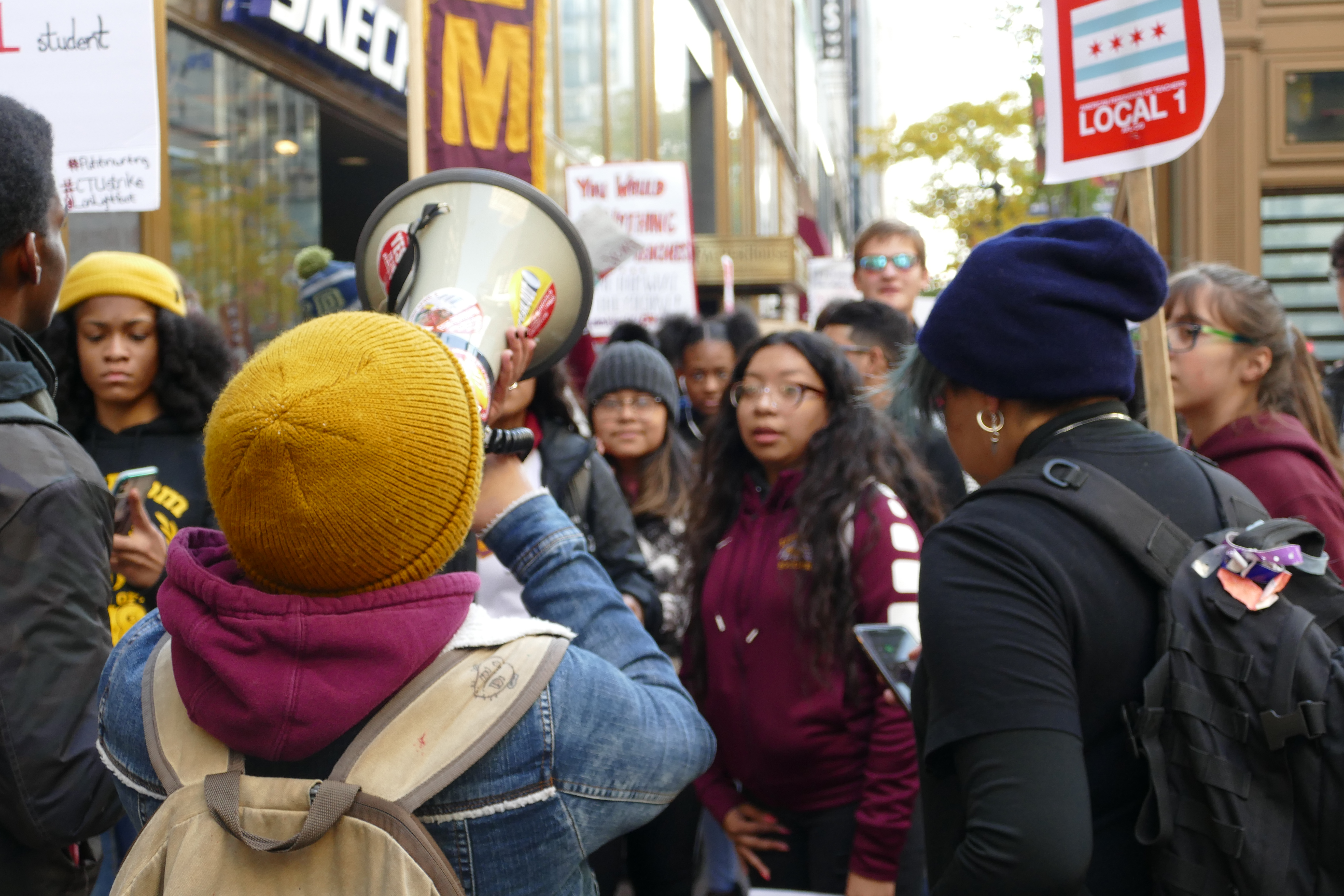
Students march north on State Street. (Marissa Nelson, 14 East)
On Thursday, October 17, CTU members went on strike over contract negotiations for a variety of reasons — issues topping the list were overcrowded classes and a need for more support staff (including social workers, librarians and nurses in schools and lower caseloads for counselors). CTU members are also asking for paid prep time and affordable housing for students and their families.
CPS students began organizing the march on Thursday afternoon. All of the organizers had spent the prior days of the strike on the picket lines with their teachers.
“We felt that the teachers, they have taken on a role that they’re fighting for us,” said David Range, a sophomore at Lindblom. “I feel like they are fighting hard but the city is not listening to the teachers. So we felt if the students were to speak up for the students, they’d be more willing to look to the students because we are the ones being affected the most.”
The Lindblom students noted needing a more consistent nurse and social workers. They expressed concerns about the mental health of their peers, and a lack of access for students with depression to people they can talk to.
“A lot of people are just showing it as if the teachers are the ones making these demands, as if they’re just asking for money, as if it’s just greed and a lot of it is affecting us and is work to change us and our learning environment,” Gatheright said. “We believe in that and we want a better experience.”
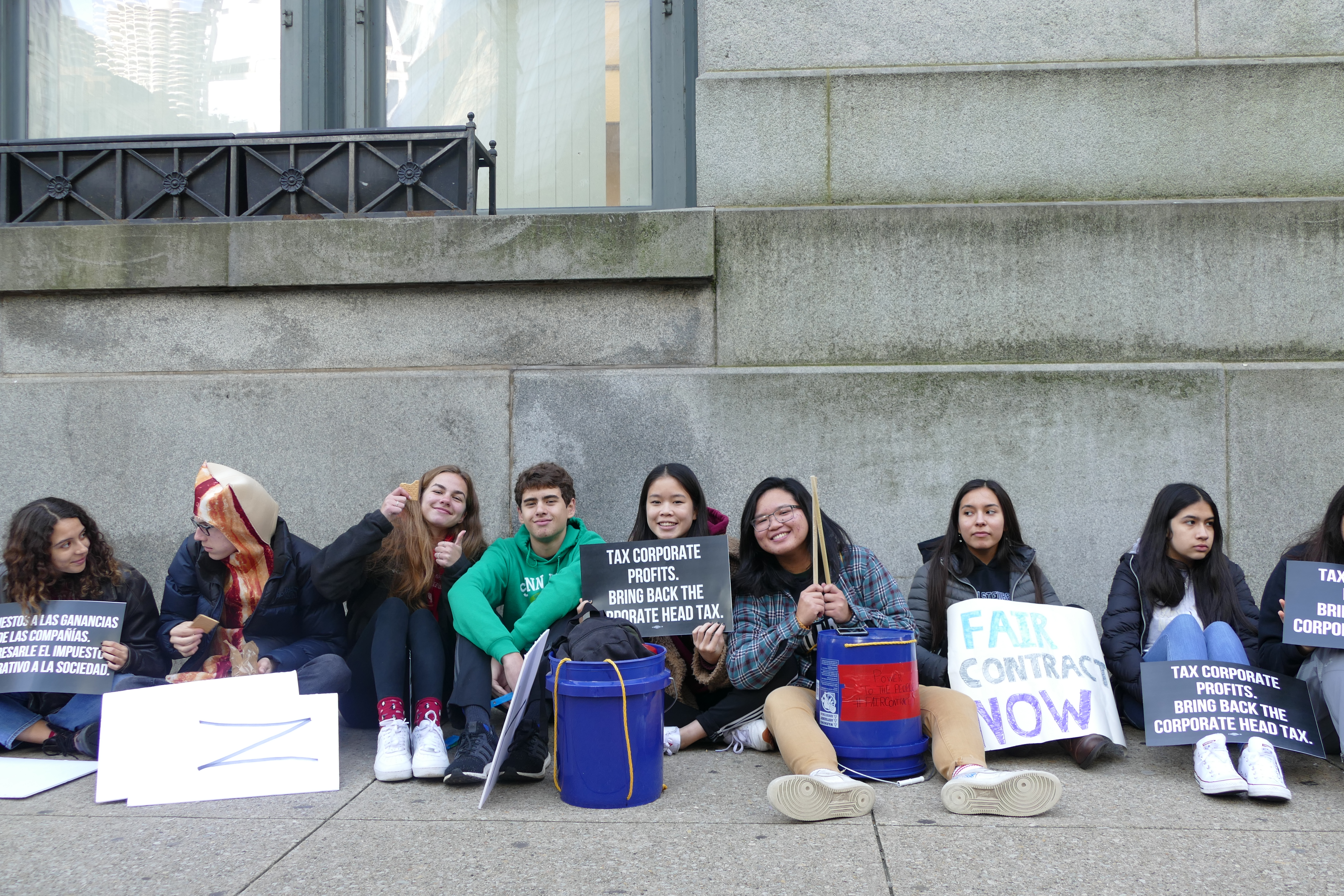
CPS students wrapped around City Hall. Senn students are pictured here. (Marissa Nelson, 14 East)
Students from at least 13 other schools gathered for the protest. They expressed concerns of support staff for students, including those with special needs and large class sizes. Many upperclassmen felt distressed about the quickly approaching deadlines for their college applications.
“The kids with special needs need extra support,” said Adrian Hernandez, a sophomore at Thomas Kelly College Prep. “They need the social workers to be there and if they’re not there then who is going to support them?”
Students from Senn High School in Edgewater said they don’t have a librarian.
“The libraries are generally used for tutoring services, but they’re not open all of the time since there’s no librarian to manage them,” said Dora Segedin, a senior at Senn. “So students don’t get that resource they previously had.”
Large classes are also a problem at Senn, students said.
“The classes are so big,” said Annika Oliver, a senior at Senn. “We don’t get the attention that we need because the teacher has to deal with so many students that sometimes they don’t have time to help you individually.”
Some of the Senn students at the protest are in cross country and learned on Friday that they wouldn’t be able to run in postseason competitions because of an Illinois High School Association (IHSA) rule preventing participation from districts whose teachers are on strike.
The students at the sit-in didn’t blame CTU members, though.
“I think that teachers are fighting for what they want and they shouldn’t have to just give it up because we want to run in a race or something,” Oliver said.
Though the students support CTU, they are growing concerned about their grades and college applications. Fall is a popular time for juniors to begin testing for college applications, such as the SAT and ACT. Moreover, early college applications are due on Friday, November 1. These applications require transcripts from a student’s school and letters of recommendation from their teachers.
“Seniors are struggling to apply for colleges because we need our transcripts and we need our letters of recommendation, but we can’t talk to our teachers about it and they can’t access their emails and they can’t send us the letters because they don’t have access,” Oliver said. “It’s stressful.”
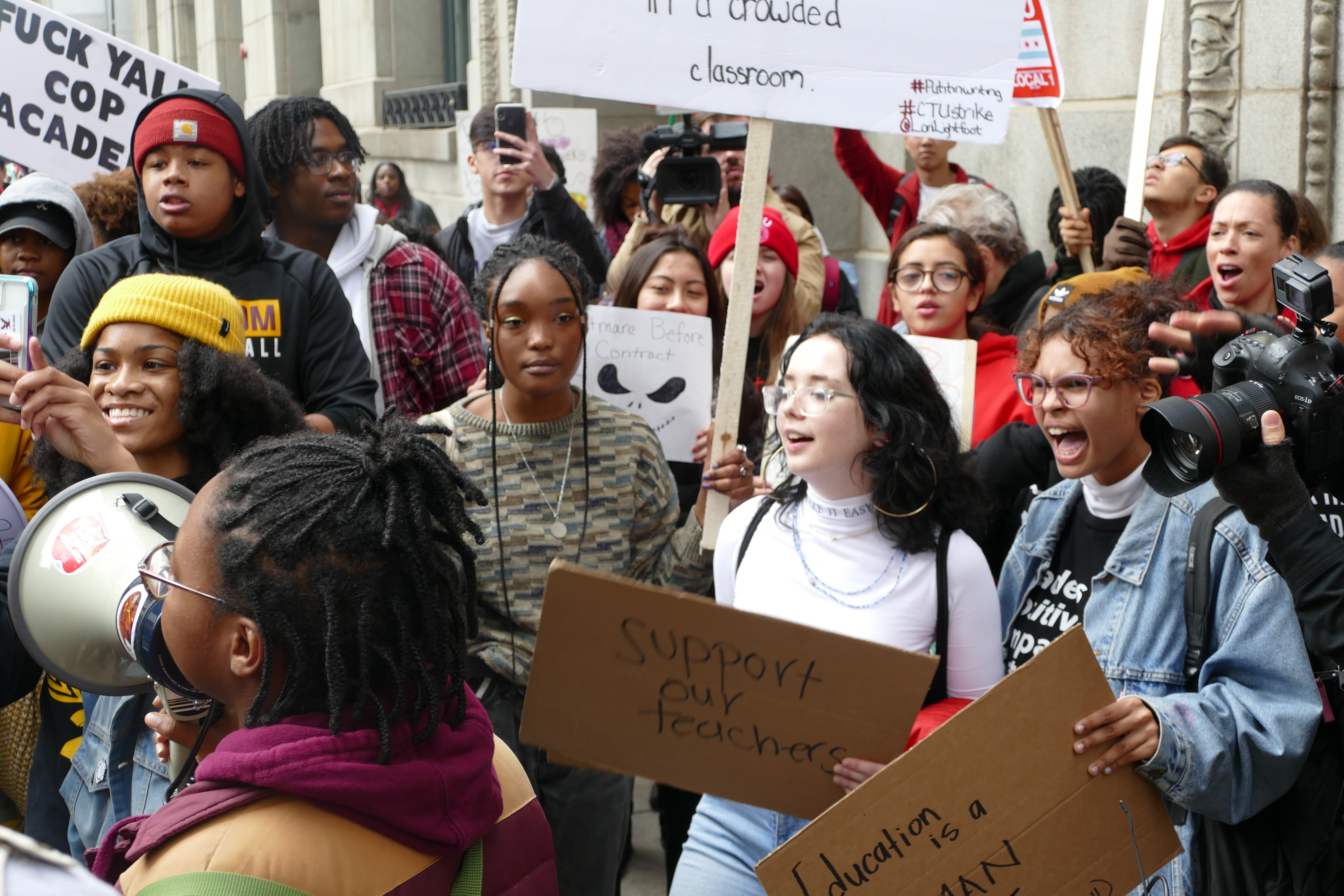
Students chanting outside of City Hall at the end of the protest. (Marissa Nelson, 14 East)
CTU and city negotiators reconvened Monday morning to continue contract negotiations. Meanwhile Service Employees International Union (SEIU) local 73, representing around 7,500 school support staff, reached a tentative agreement with CPS on Sunday.
On Monday evening, CPS canceled classes for Tuesday.
Audioscape by Marissa Nelson, 14 East
Day 9: Tilden Career Community Academy High School
October 25, 2019
Marissa Nelson and Chris Silber reported from Tilden Career Community Academy in New City on Friday morning. They live tweeted their coverage. Grace Del Vecchio reported from the rally at Buckingham Fountain.
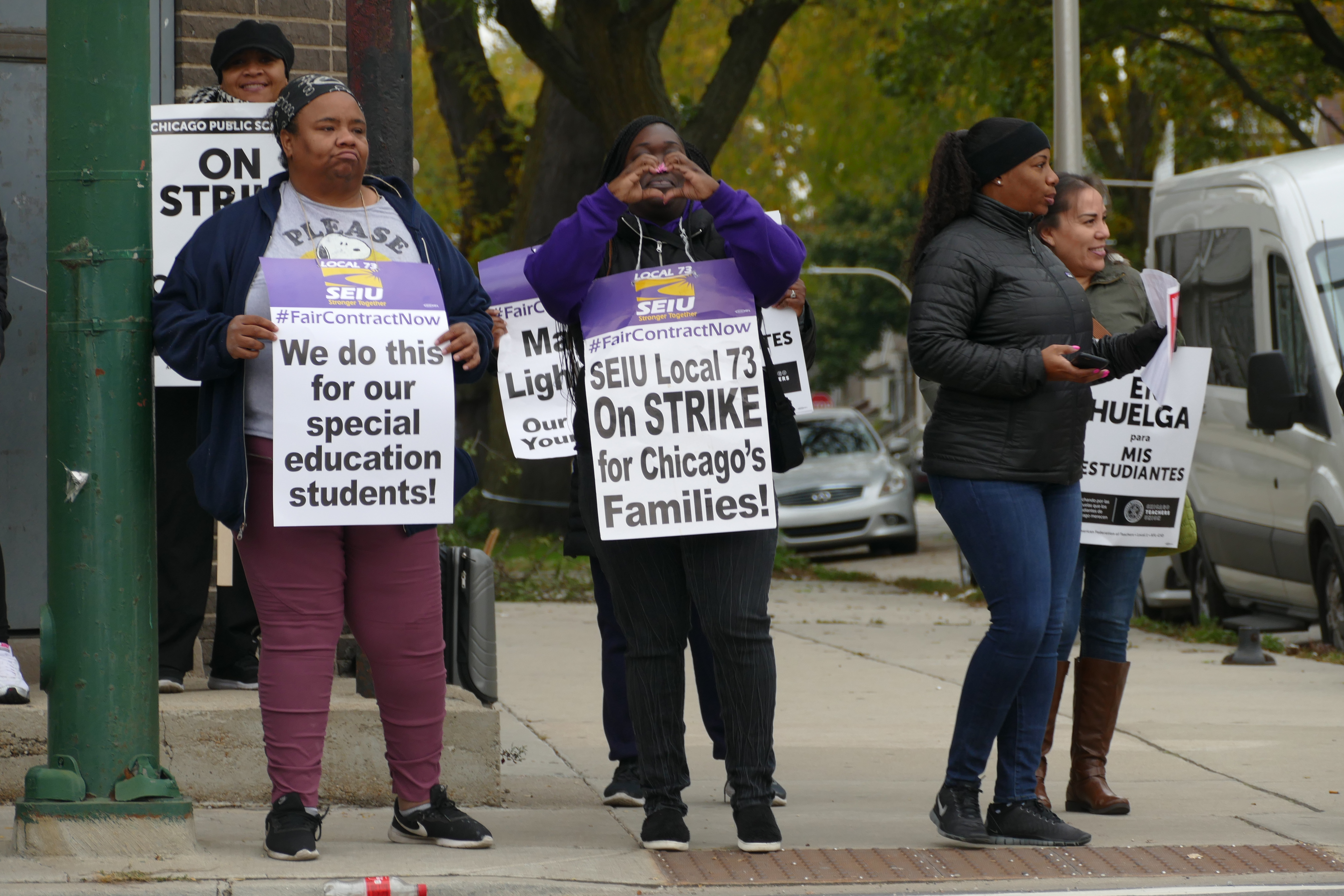
Tilden CTU and SEIU strikers stand on the corner of 47th and Union (Marissa Nelson, 14 East)
The freight trucks that frequent West 47th Street near the Norfolk Southern rail yard gave sturdy honks while passing educators on strike at Tilden Career Community Academy early on Friday, October 25. The 2019 Chicago Teachers Union (CTU) strike continued into day nine.
On Thursday, October 17, CTU members went on strike over contract negotiations for a variety of reasons — issues topping the list were overcrowded classes and a need for more support staff (including social workers, librarians and nurses in schools and lower caseloads for counselors). CTU members are also asking for paid prep time and affordable housing for students and their families.
Special Education Classroom Assistants, or SECAs, have also been on strike since October 17, and are unionized through the Service Employees International Union (SEIU) Local 73. They’re on strike for better pay for SECAs, assurance that SECAs are not pulled away from their job for other school duties, ending the use of companies Sodexo and Aramark to manage the work of custodians and increased benefits such as paid holidays.
CTU formed in 1897 as the Chicago Teachers Federation, but didn’t host its first strike until 1969 — 50 years ago. CTU has been on strike a total of 11 times since then — and it looks like this year’s strike could be its longest yet. Tilden has a rich history in Chicago. The building, which opened in the 1880s, has served as a CPS building for more than 100 years, and has seen the city through all 11 strikes.
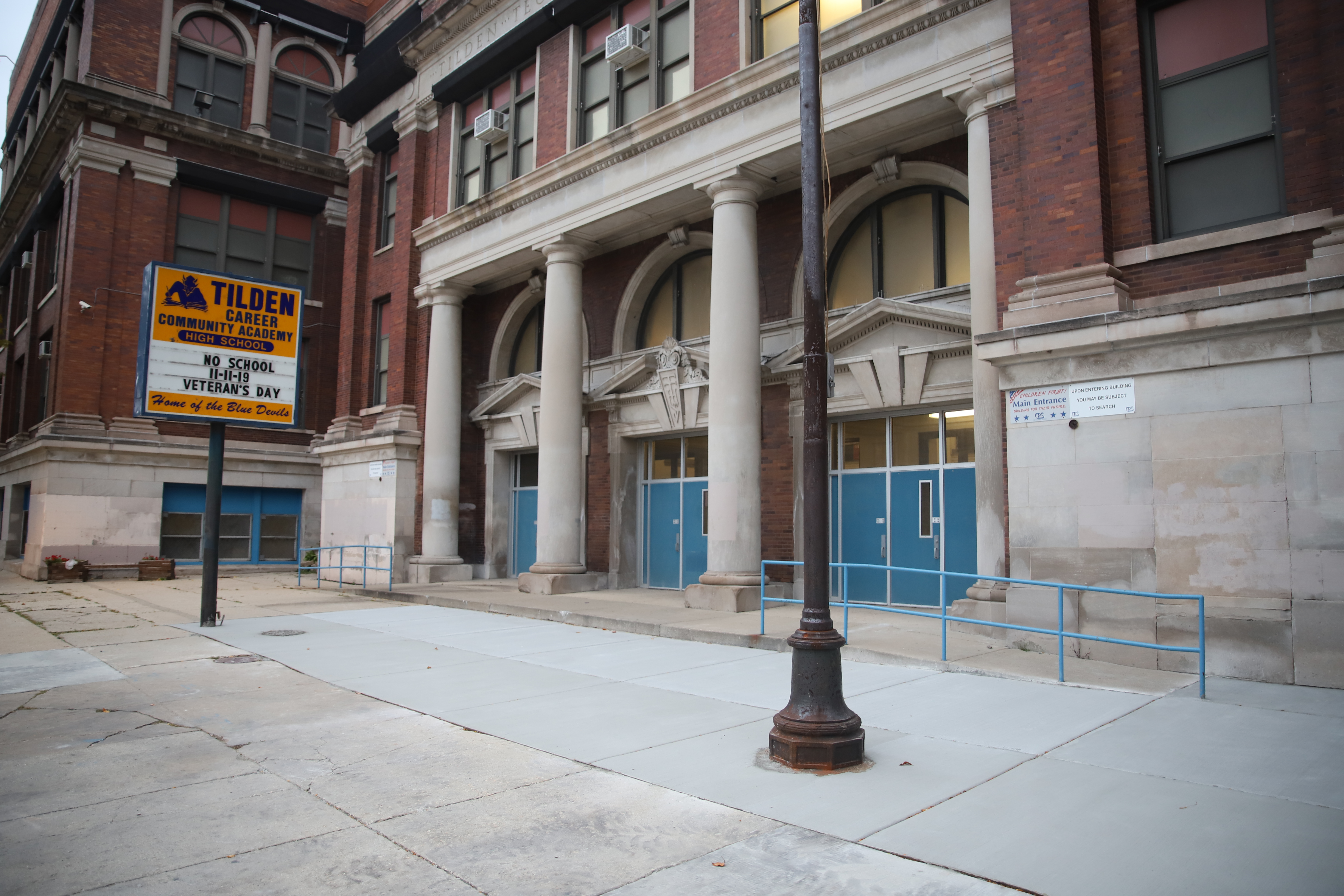
Tilden Career Community Academy High School has stood on Union Avenue for more than 100 years (Christopher Silber, 14 East)
Tilden is a neighborhood high school with deep roots in its surrounding communities of Canaryville, Fuller Park, Back of the Yards and Englewood.
At the picket line members of both the CTU and SEIU discussed their roles as educators, the emotional and financial stress of working in an understaffed school and working through trauma both in their own lives and as support figures.
Today, special education teacher Krystle Saylor said Tilden has around only 200 students. Even so, Saylor and the other educators echoed concerns heard at other picket lines around the city this week: they don’t have enough support staff to help all of their students — whether counselors, nurses, social workers or paraprofessionals.
“Every single one of [the students] is living through or has survived some kind of trauma, yet we have a social worker one day a week, a nurse one day a week,” Saylor said. “And the one day a week they are here are the days we’re writing IEPs so they’re in IEP meetings all day. They’re not able to service the students as they would like to service the students.”
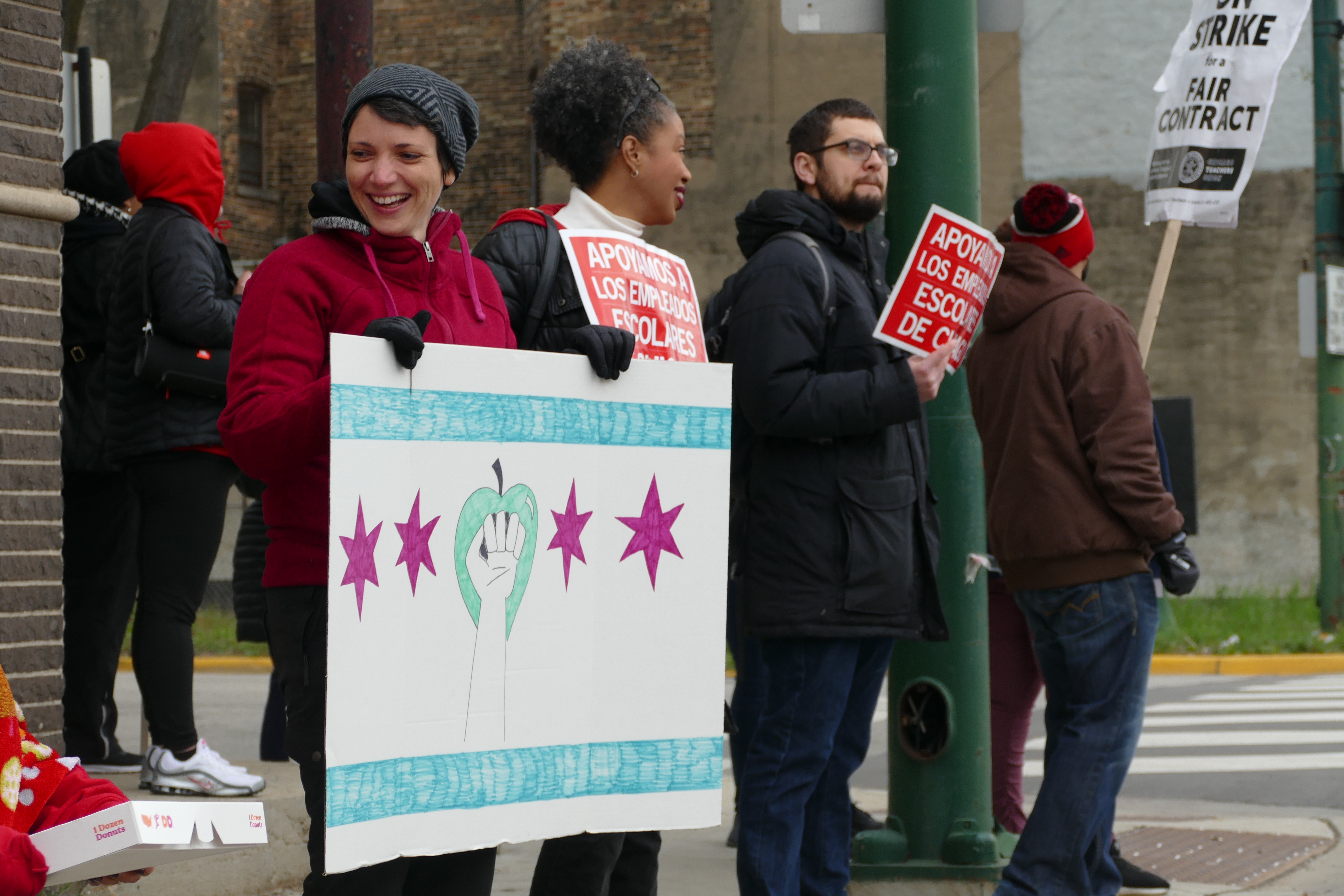
(Marissa Nelson, 14 East)
An IEP is an individualized education program that eligible public school students receive. It’s a legal document that maps out a student’s special education plan, from individualized instruction and support to services necessary for a student to be successful in school.
The educators emphasized Tilden’s need for more counselors and social workers — or at least ones who work every day. Their students bring trauma they have experienced with them to school, or sometimes traumatic events occur that affect the whole school. Perry said each of the 16 years she has been at Tilden the school has experienced a death, whether due to gun violence or something else.
This isn’t something they are prepared to help students through. However, without consistent support staff, they are forced to. One student’s death stood out to the educators. Delaina Benson, a SECA at Tilden, said the student was loved by everyone. When he died, everyone from the teachers and staff to the students were affected.
Tilden had to call a crisis response team because they only had one social worker there consistently, Saylor said. The students weren’t comfortable around them because they didn’t know any of them, she said.
“If we had had a social worker at that time, if we had had someone the kids were comfortable to come and talk to, they wouldn’t have been on our shoulders,” Benson said. “I literally had three students on my shoulder crying. Literally, I’m a paraprofessional. I don’t know how to console these students in a way that is professional, but I can console them as a mother.”
Benson, who said she works multiple jobs to support herself, said she feels SECA employees aren’t valued by the city or CPS. She is one of three paraprofessionals at Tilden, she said.
“We have three paras in a school that needs way more,” Benson said. “We have three paras and they are working us to death.”
No matter the emotional or financial strain put on SECA employees, they and other educators at the school say they continue to support their students as best they can. This often includes buying food, paying for bills or purchasing other necessary supplies.
“We always have taken care of somebody’s bills, I myself have paid somebody’s bills while I was going through foreclosure myself,” said Donna Perry, a special education teacher. “We have put groceries in kids’ hands to take home to their families, dog food even. And you know what everybody looks forward to to senior year, prom. How many proms have we paid for over the years and the clothes to go with the prom and the hair.”
“We have been the mamas. We have been the papas. We have been the daddies. We have been the cousins. We have been the big sisters to these kids all these years.”
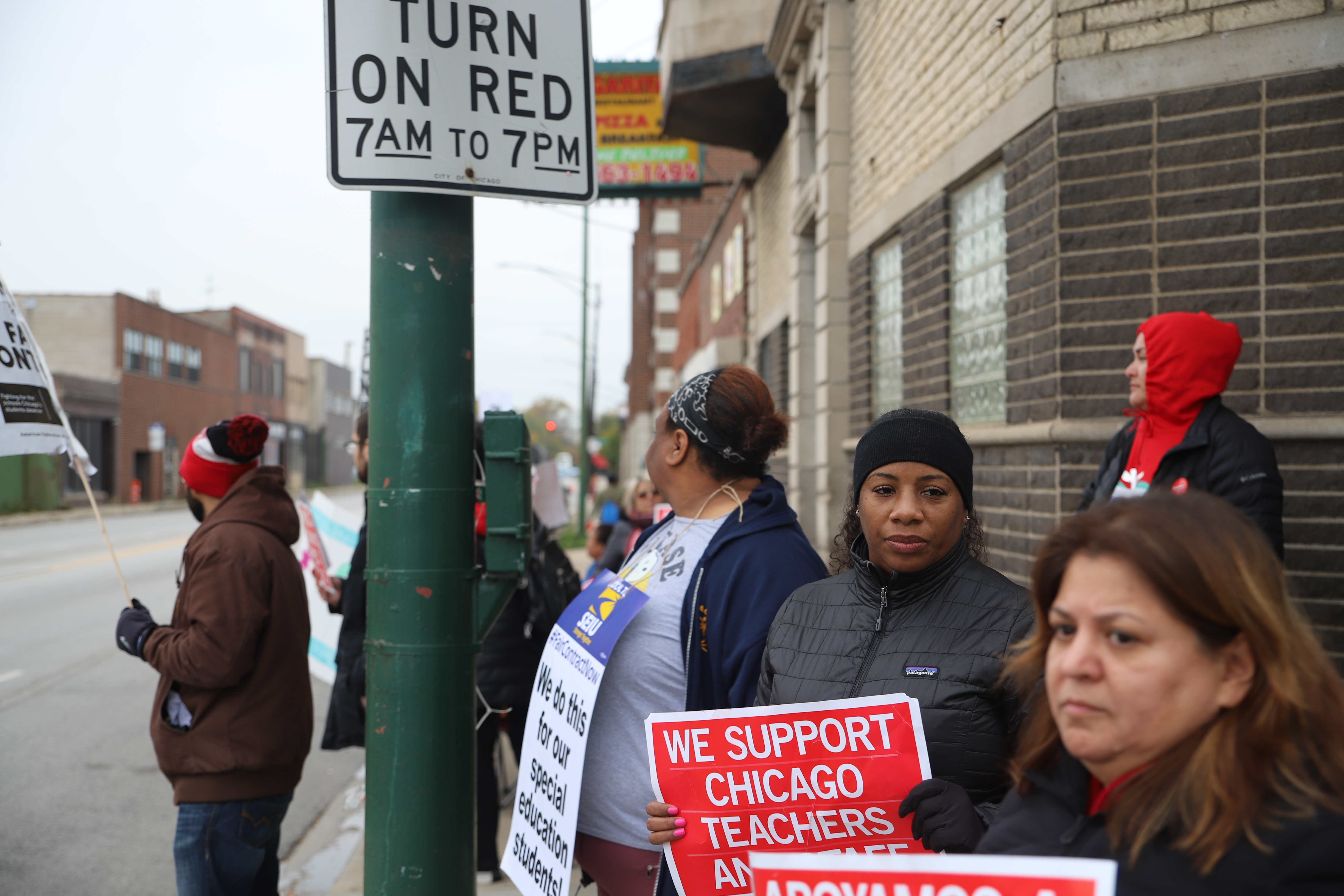
(Christopher Silber, 14 East)
On Friday negotiations continued but no contract agreement was reached. However the union said they are closing in on the final issues and they have reportedly received written proposals for class size and staffing.
Negotiations continued into Saturday, with a roughly 14 hour session that wrapped just before midnight. With no agreement reached, both sides still felt school on Monday was a real possibility for the district. They began negotiating again on Sunday.
Saturday, CTU President Jesse Sharkey said the union and the city were close to an agreement — only $38 million apart.
However in a news conference Sunday morning CPS Chief Education Officer Tanya McDade said they’re stuck.
“Philosophically, we are in agreement that we want our schools to have more of what they need,” she said. “Where we are far apart is the ‘how,’ not the ‘what.’ How do we get there while maintaining a level of financial stability and responsibility for the district’s finances?”
Meanwhile, a judge ruled that if classes aren’t back in session, cross-country runners can’t compete in postseason events. This is because of an Illinois High School Association rule that prohibits athletes from participating if their schools are on strike. However, three CPS football teams might still be able to participate in playoffs, as long as they are able to hold three practices before the game.
In the afternoon CTU and SEIU Local 73 members led a march downtown that ended at the Buckingham Fountain. During the rally, Chicago Police Department police officers blocked them from walking onto Lake Shore Drive.
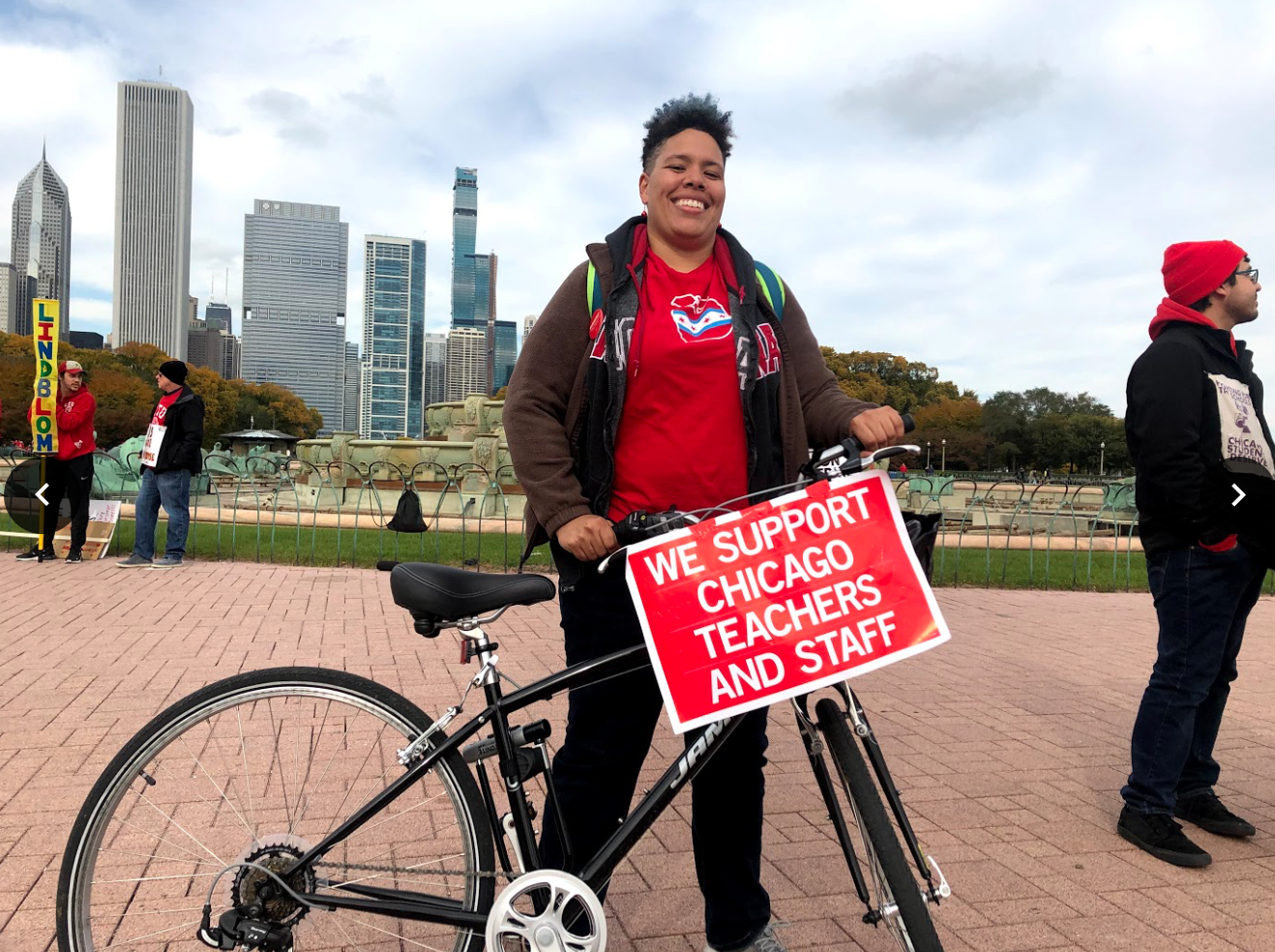
(Grace Del Vecchio, 14 East)
“I just really care for [my students] and I want to be back with them as soon as possible,” said Melissa Georgiou, a 4th and 5th grade teacher at South Shore Fine Arts Elementary School. “Our school doesn’t have a library, it was dismantled this past year. We had a library but no librarian, so it fell into disrepair. And we only have a nurse once a week.”
“I know for the long term, I need to be out here protesting, but in the short term, I really miss them,” she said.
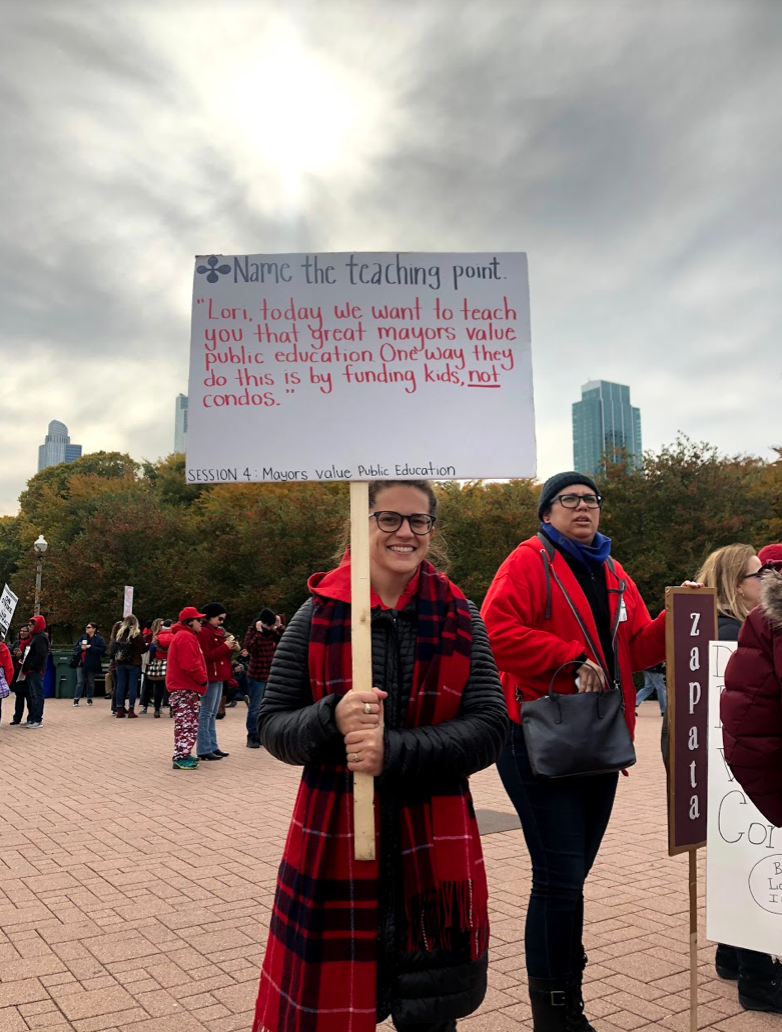
(Grace Del Vecchio, 14 East)
“I want them to know that we’re fighting what’s best for them,” said Mary Kleiman, a 2nd grade teacher at Zapata Academy in Little Village, with tears in her eyes. “Smaller class, so they can get the attention they deserve, social workers, so they can have people to help them with anything they’re going through emotionally, nurses, for they’re not feeling well. All the things they need to become the best people they can be.”
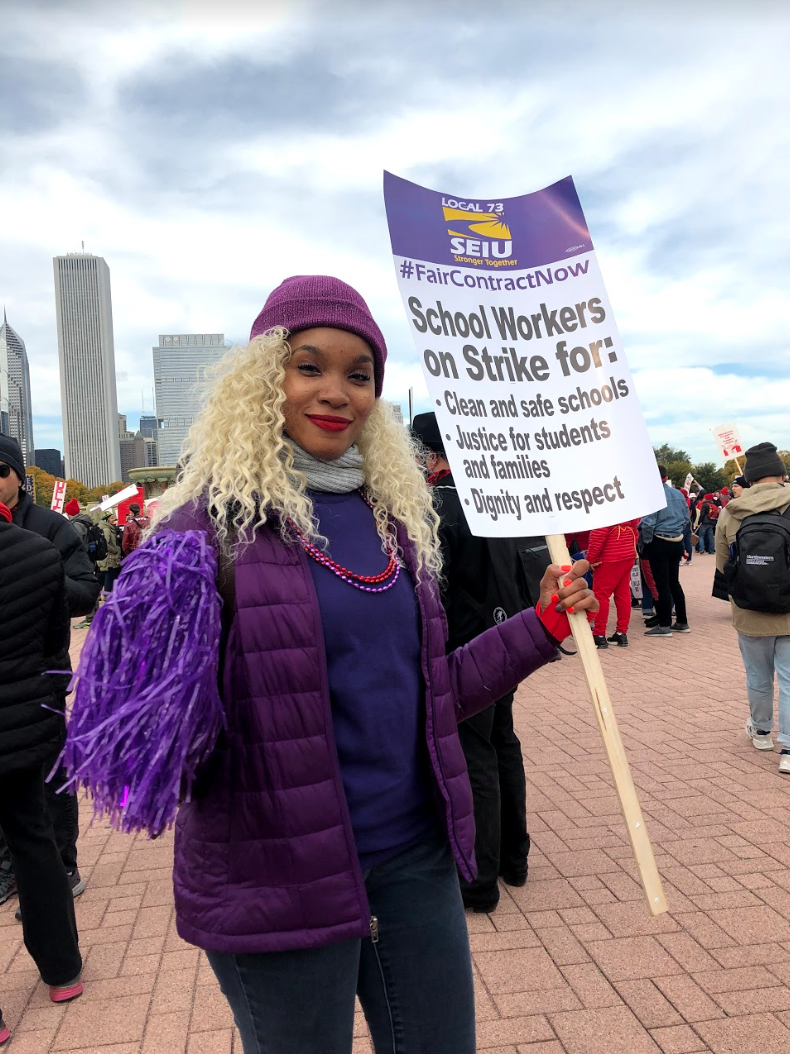
(Grace Del Vecchio, 14 East)
“I’m here because we haven’t had a contract in over 17 months, I’m fighting for a raise and better schools for all the students,” said Shavona McGregor, a bus aid and SEIU member. “I feel like the mayor and the city don’t care about public schools, so I’m here fighting to show them that they are important. Public schools matter. We all matter.”
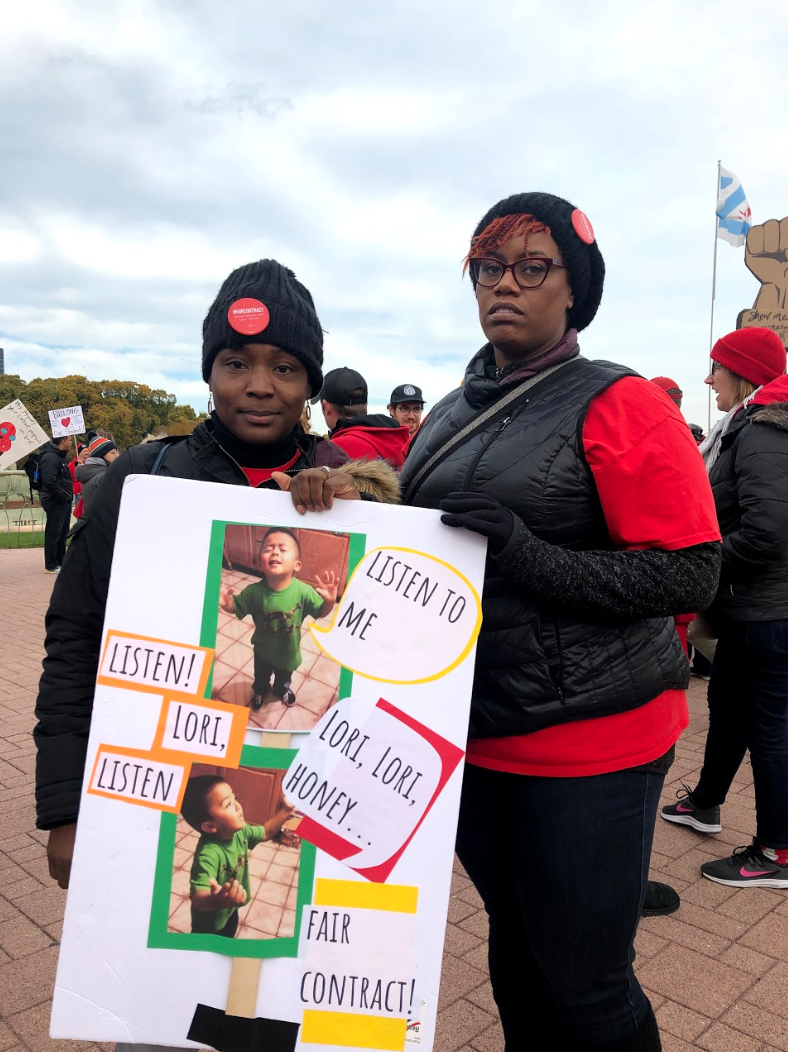
(Grace Del Vecchio, 14 East)
For Tarsia Rhyne, a kindergarten teacher at South Shore Fine Arts Academy, staffing is the main reason she is striking, specifically the lack of staffing around nurses and counselors.
“If you’re their teacher, do you really think they’re going to want to come to you and talk to you about something that’s personal?” said Rhyne. “Now they know you’re on another level, they don’t feel like they can share everything with you that they need to share. So that’s why I really hope that we get the staffing that we need.”
Day 8: Talman Elementary School
October 24, 2019
Francesca Mathewes and Patsy Newitt reported from Talman Elementary School in the Gage Park neighborhood on Thursday. They also live tweeted their reporting.
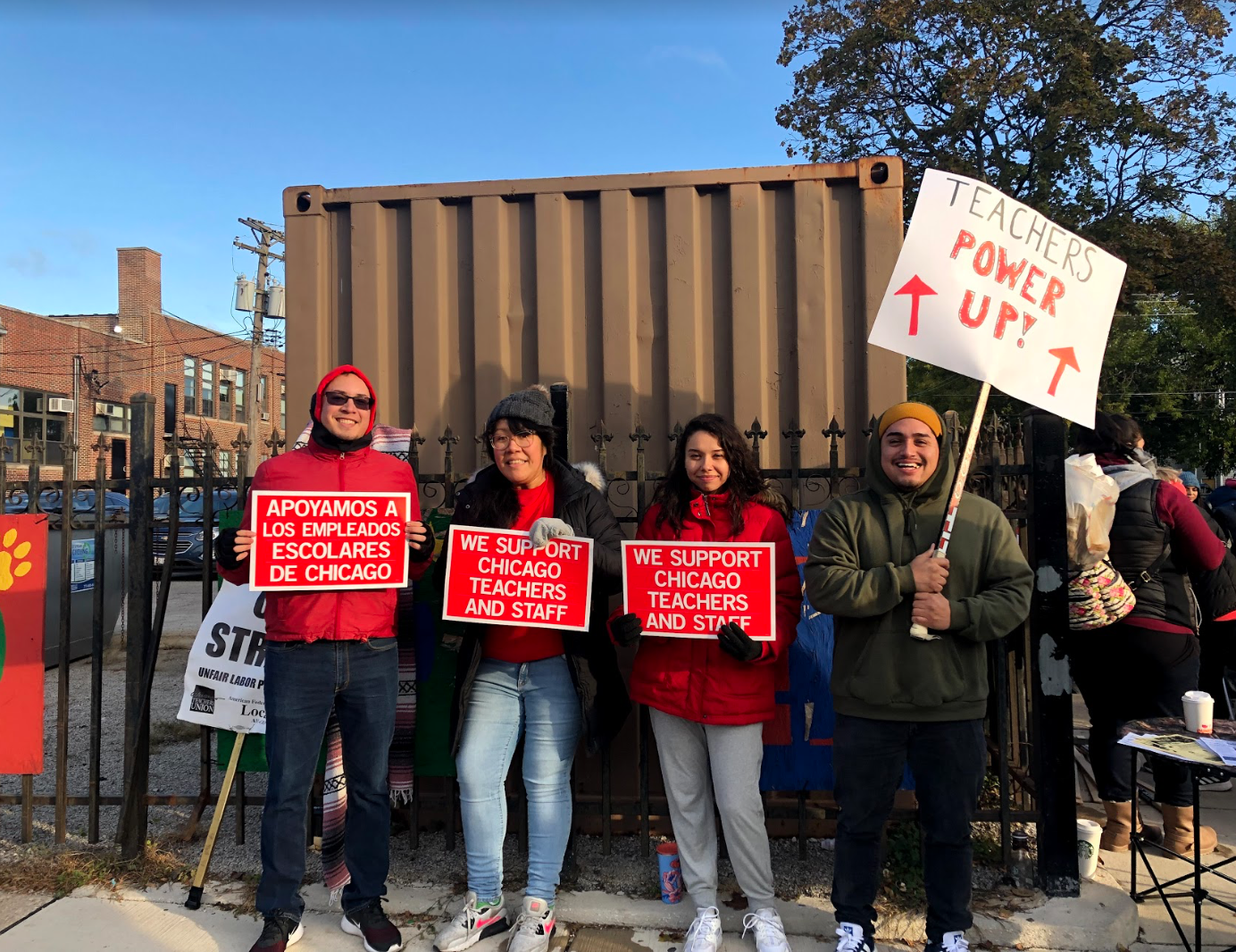
Teachers and supporters from Talman Elementary hold signs during the strike on Thursday morning. (Francesca Mathewes, 14 East)
The Chicago Teachers Union (CTU) and Service Employees International Union (SEIU) strike entered its eighth day on Thursday, October 24, after “tentative agreements” had been reached on a variety of issues but none of their “top priorities.”
Mayor Lori Lightfoot told the Chicago Sun-Times Editorial Board that she would not cave to secure a teachers contract — refusing to give in to what she refers to as a CPS bailout.
Previous district offers have fallen short of the CTU’s requests, including ensuring staff positions like librarians, nurses and counselors and caps on class sizes, which are estimated to increase the $7.7 million budget proposed earlier this month by $2.4 billion over three years. According to a CPS instagram post this morning, the district has a new proposal, which includes adding a full-time nurse and social worker for every school, investing millions to lower class sizes in high-need schools and investing millions to support students experiencing homelessness.
Thursday marks day six without school, with an estimated 300,000 students out of class. Those on strike are returning to the picket lines after a larger demonstration downtown yesterday, which climaxed at a protest outside of City Hall during Lightfoot’s first budget address.
Strikers at Talman Elementary in Gage Park collected around a fire in a circle of chairs on W. 55th and S. Rockwell streets, cars honking support as they passed by. The group roasted hot dogs and played pop radio hits — tired, but unwavering.
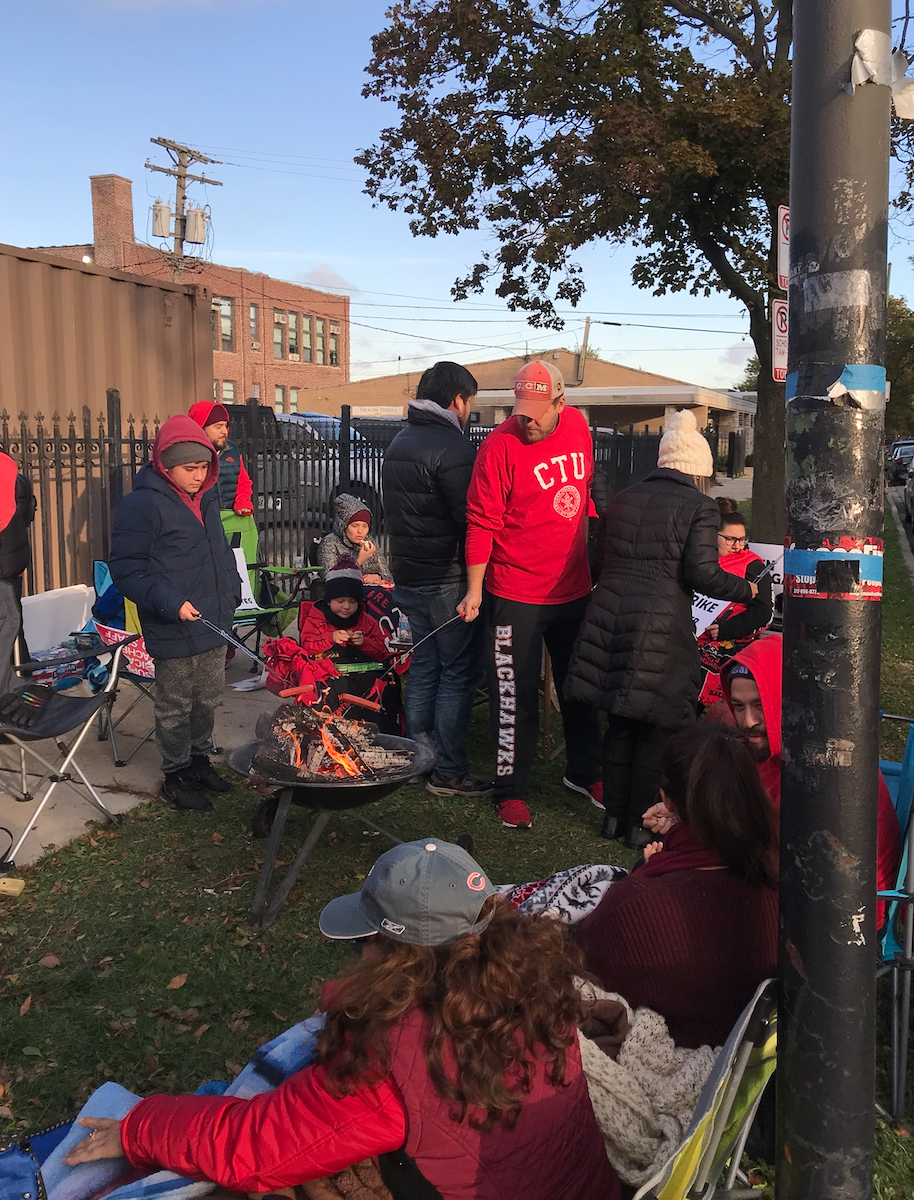
Strikers at Talman Elementary School in Gage Park roast hotdogs and s’mores. (Patsy Newitt, 14 East)
“We’re all tired,” said Bill Khlumsky, special education teacher at Talman. “We would much rather be back in the classroom than standing out in the cold… At the same time, we’re not willing to give up on our students.”
This was echoed by other Talman staff. “We’re physically, mentally and emotionally tired but not defeated,” said Leticia Ortiz, a preschool teacher at Talman.
Teachers cited wanting to go back to work, but feel they can’t until they’ve secured better conditions.
“We prefer to be at work,” said Gloria Araujo, special education classroom assistant. “We miss our students and I’m sure they’re missing us.”
Both Khlumsky and Araujo are specifically concerned about the readjustment of their special education students. They likened the transition to summer — having to re-establish routine and behavioral standards.
“By the time they get back it’ll have been maybe even two weeks,” Khlumsky said. “They’ll have lost those routines they established.”
These routines are critical, Araujo said, because they require one-on-one attention from a support staff that’s limited. The strike will likely put them behind.
Araujo is also concerned with social readjustment, expecting the loss of schedule to confuse students.
“I really do believe that [special education] kids are wondering why they’re not getting on the bus,” Araujo said.
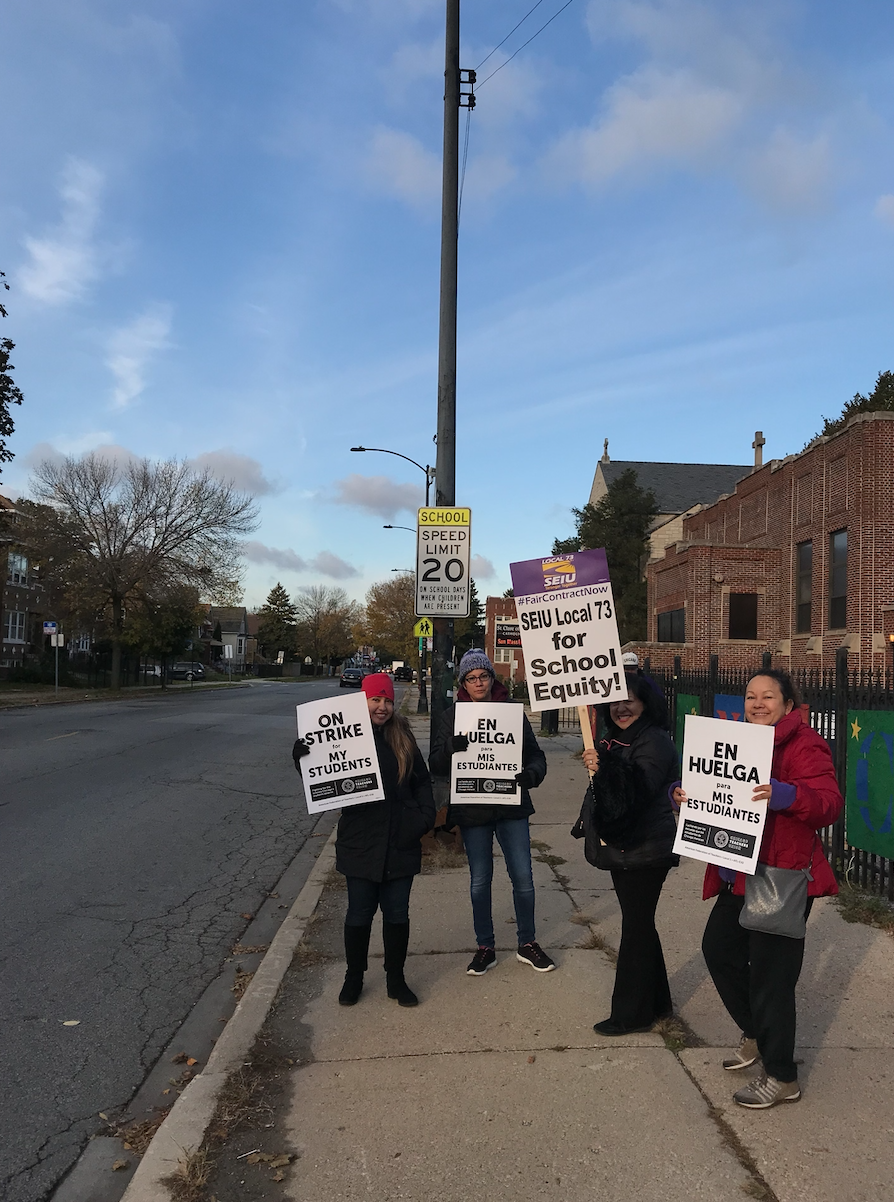
Picketers hold signs on W. 55th Street outside Talman Elementary. (Patsy Newitt, 14 East)
The teachers on strike at Talman reiterated the larger demands of CTU — more prep time, better staffing and more resources for students who need them.
“We want more resources for our students. We want nurses in every school, full time. Not one that just comes in once a week to finish paperwork,” Ortiz said. “If a kid busts his lip or something, we have to stop instruction to take care of it.”
She also mentioned the reality that some CPS students enter the classroom every day with unresolved trauma, creating barriers to learning.
“We need counselors in every school to take care of students that are going through trauma, who need that support every day,” she said. She also mentioned libraries and librarians to staff them as resources many schools are in need of.
“Some schools have libraries, but not all of us,” said Cynthia Ruiz, another teacher at Talman.
A less visible struggle in CPS schools also includes preparation time –– time for teachers to grade, enter data, do paperwork and plan curriculum. CTU is demanding more prep time for teachers.
“We already spend hours of our own personal time staying after school, coming in early or taking work home to do it. We take personal days to finish work at home because we’re not able to do it here,” Ortiz said.
As of this morning, there was no end to the strike in sight and teachers said they will continue to picket until their demands are met.
“If we back down now, then we’re back to the broken system that we’ve had for years,” Ortiz said. “We’re sending the message that this is the time, the moment to make a huge difference. To better the education system for our students, parents, teachers and staff.”
Day 7: Rally to City Hall
October 23, 2019
Marissa De La Cerda and Meredith Melland reported from downtown, starting at the Willis Tower and ending at the Thompson Center where CTU, SEIU and strike supporters gathered for a rally after Mayor Lightfoot’s budget address on Wednesday morning.
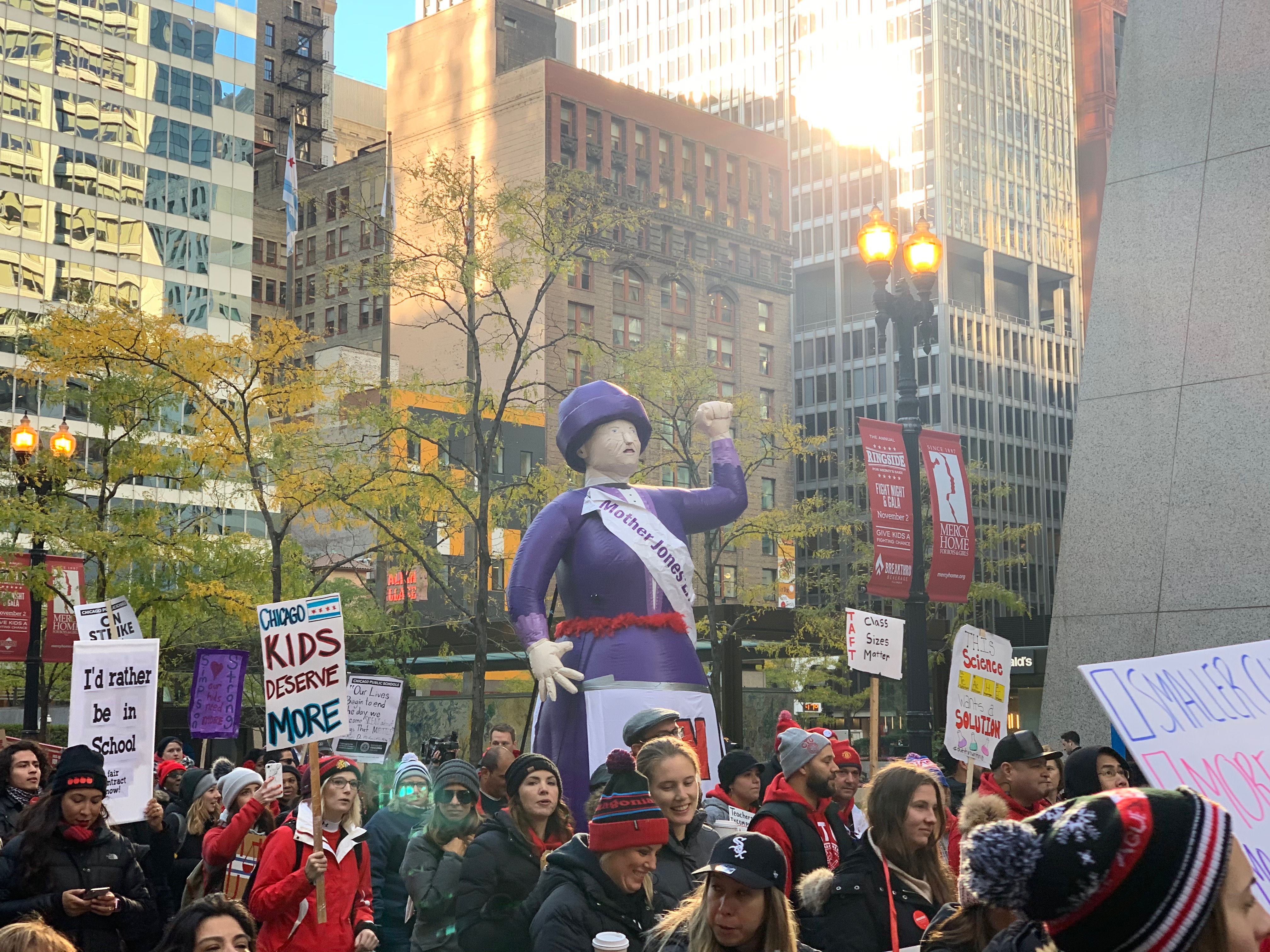
(Marissa De La Cerda, 14 East)
A week into the strike that began on October 17, Chicago Teachers Union (CTU) members and Service Employees International Union (SEIU) members are still picketing for a new contract (which includes smaller classroom sizes, better wages for support staff, paid prep time for their classes and affordable housing for students) after failing to reach an agreement on Tuesday. Chicago Public Schools canceled school on Wednesday, marking the fifth day of class cancellations.
On Wednesday, instead of gathering outside of the schools, however, a few thousand union members, along with strike supporters, congregated as early as 8 a.m. at different parts of downtown on Wednesday morning before marching towards City Hall where Mayor Lightfoot would be giving her first budget address as mayor.
They walked and danced their way through the closed-off streets of downtown. They waved banners and chanted, “Get up! Get down! Chicago is a union town,” while waving signs and flags. Some surrounding people in the area rushed down the sidewalks on the way to work, but others high-fived protesters, yelled messages of encouragement or raised their fists in solidarity.
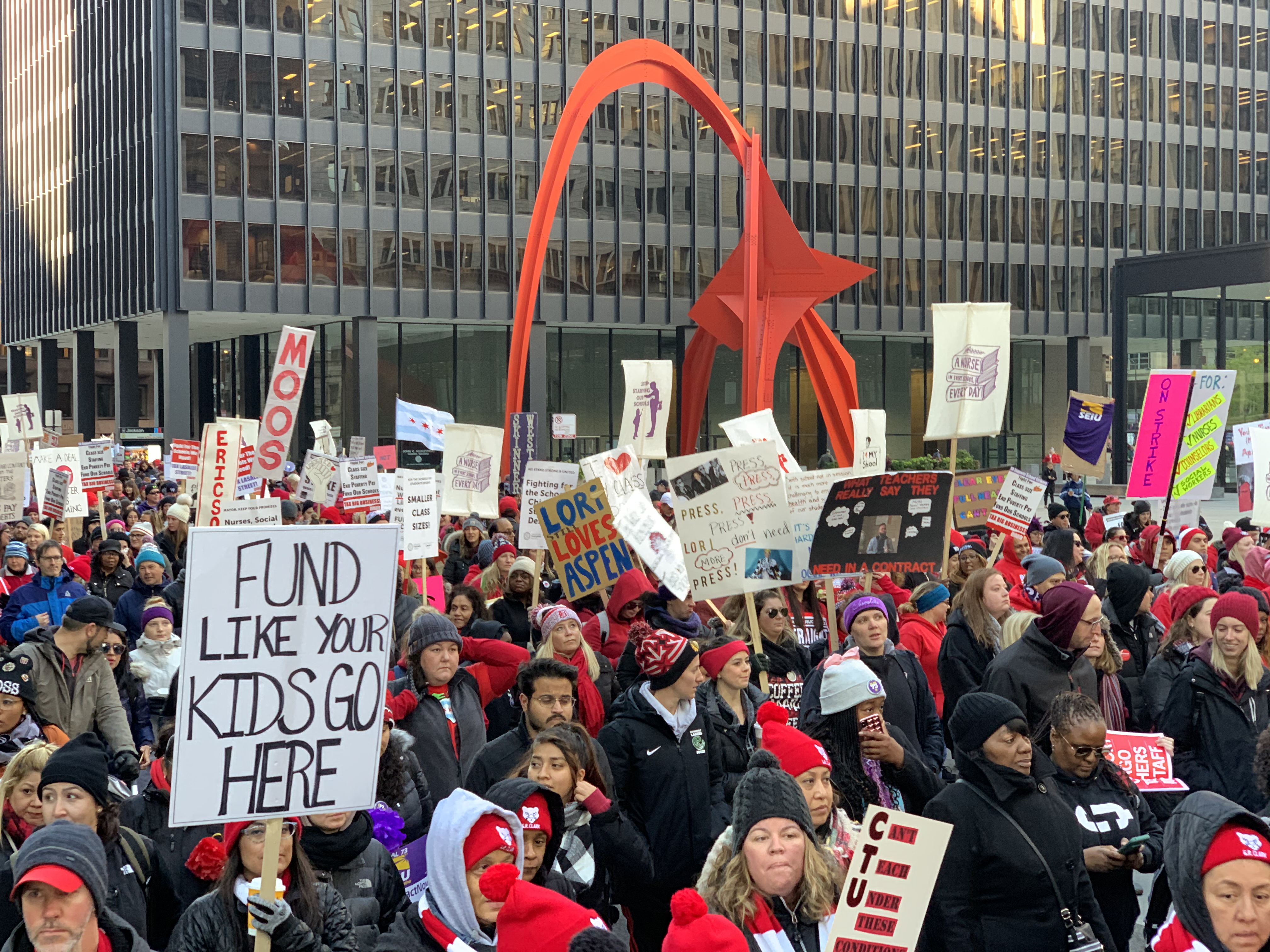
Teachers and staff members echoed concerns over the lack of access to affordable housing for their homeless students. (Marissa De La Cerda, 14 East)
Teachers and staff members echoed concerns over the lack of access to affordable housing for their homeless students.
“There are over 16,000 students that are homeless,” said Carrie Watterson, a pre-k teacher at Cook Elementary School in the Auburn Gresham neighborhood on the city’s South Side. “How are they supposed to do their homework if they don’t have a home to go home to?”
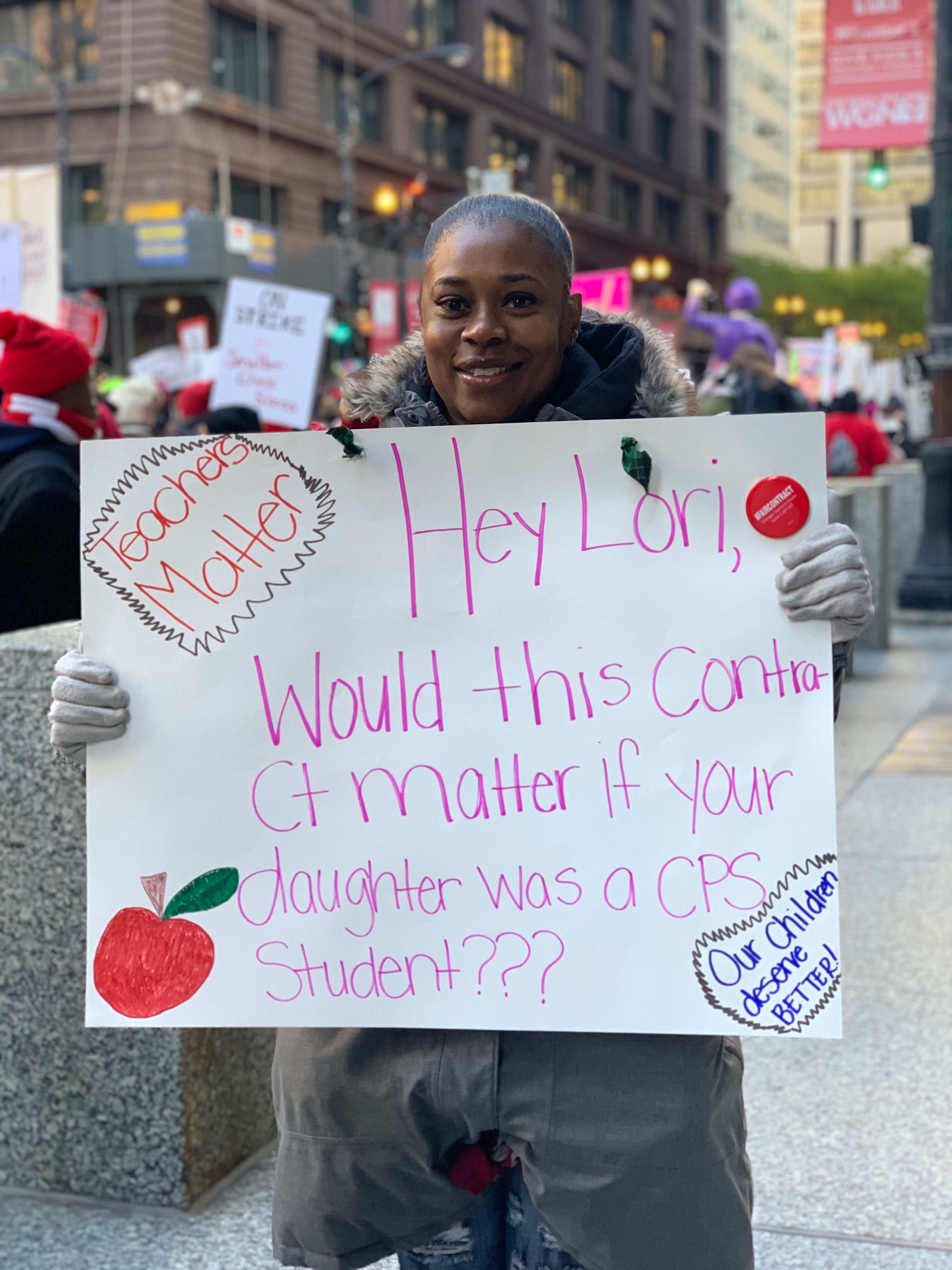
Carrie Watterson, Pre-K teacher at Cook Elementary School, holds a sign at the October 23 rally. (Marissa De La Cerda, 14 East)
She also stressed the importance of fighting for more support staff, especially staff who are equipped to work with students with disabilities. “There’s not enough support staff,” she said. “Not enough staff or nurses in the school to be there five days a week to help us take care of diverse learning children, kids that have sickle cell, children with epilepsy… these kids need this care.”
Similarly, Erin Lynch, visual arts teacher at Friedrich L. Jahn Elementary of Fine Arts, emphasized the need for a more livable wage for support staff and teacher’s assistants. She said that many of these staff members have to work multiple jobs to survive. “One of our members works all day at school and then works at Walgreens until 9 or 10 at night,” she said.
Angelina Griggs, substitute special-ed classroom assistant and member of SEIU Local 73, said that aside from wanting to have a wage that’s above the poverty level, support staff also want more benefits, including sick or vacation days.
Additionally, she stressed the importance of smaller classroom sizes, especially for classrooms with special needs students. “When a class has over 30 students, it’s hard for them to get the required attention from their teachers even if the classroom and material is catered to special needs students,” she said.
In terms of how they’re feeling about contract negotiations and Mayor Lightfoot’s budget address, many are not as hopeful as they originally were.
“I felt hopeful until I received an email stating that Lightfoot is demanding we go back to work without pay,” Watterson said. “So I don’t really feel hopeful right now. I feel like she’s being extremely stubborn.”
Sandra Congreive, a former CPS teaching assistant, said she doesn’t know what to expect at this point in negotiations. “I have this gut feeling that there is money and I’m afraid that it’s going to get political and may not go in the direction we want,” she said.
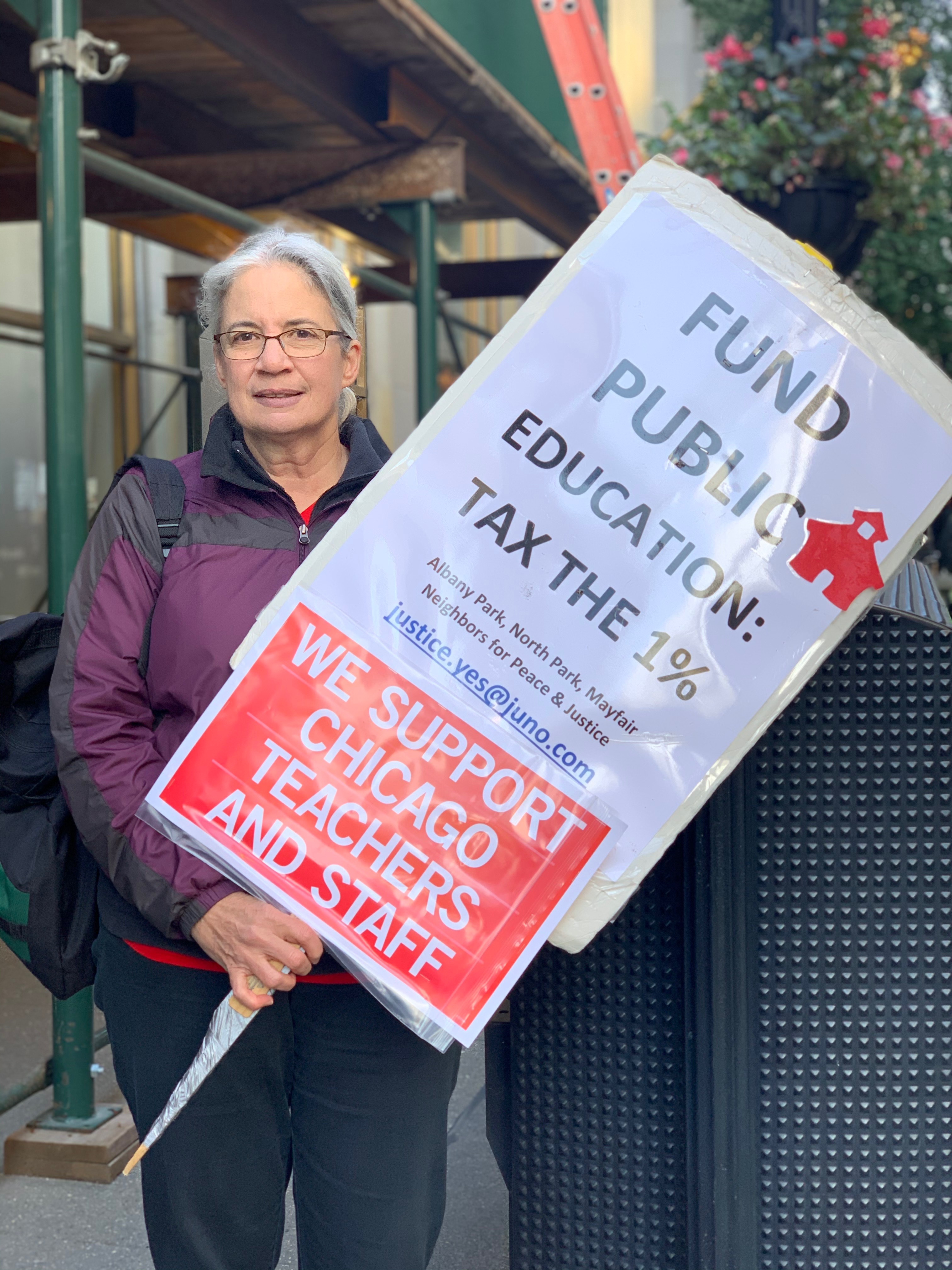
Sandra Congreive, former CPS teaching assistant. (Marissa De La Cerda, 14 East).
As the rally continued, Lightfoot began her address. She announced that she has managed to generate $163 million for CPS ($66 million more than last year), which would only be enough to cover the $500 million CTU has already rejected.
Negotiations between CTU and CPS continue as of 4:30 p.m, but it remains unclear whether an agreement will be reached before the weekend.
Day 6: Kelvyn Park High School
October 22, 2019
Christopher Silber reported from Kelvyn Park High School in Hermosa on Tuesday morning.
Chicago Teachers Union (CTU) members hit the picket lines again on Tuesday morning after the union and city could not finish contract negotiations and reach an agreement on Monday, marking the sixth day of the strike.
On Thursday, October 17, CTU members went on strike over contract negotiations for a variety of reasons — issues topping the list were overcrowded classes and a need for more support staff (including social workers, librarians and nurses in schools, and lower caseloads for counselors). CTU members are also asking for paid prep time for their classes and affordable housing for students and their families.
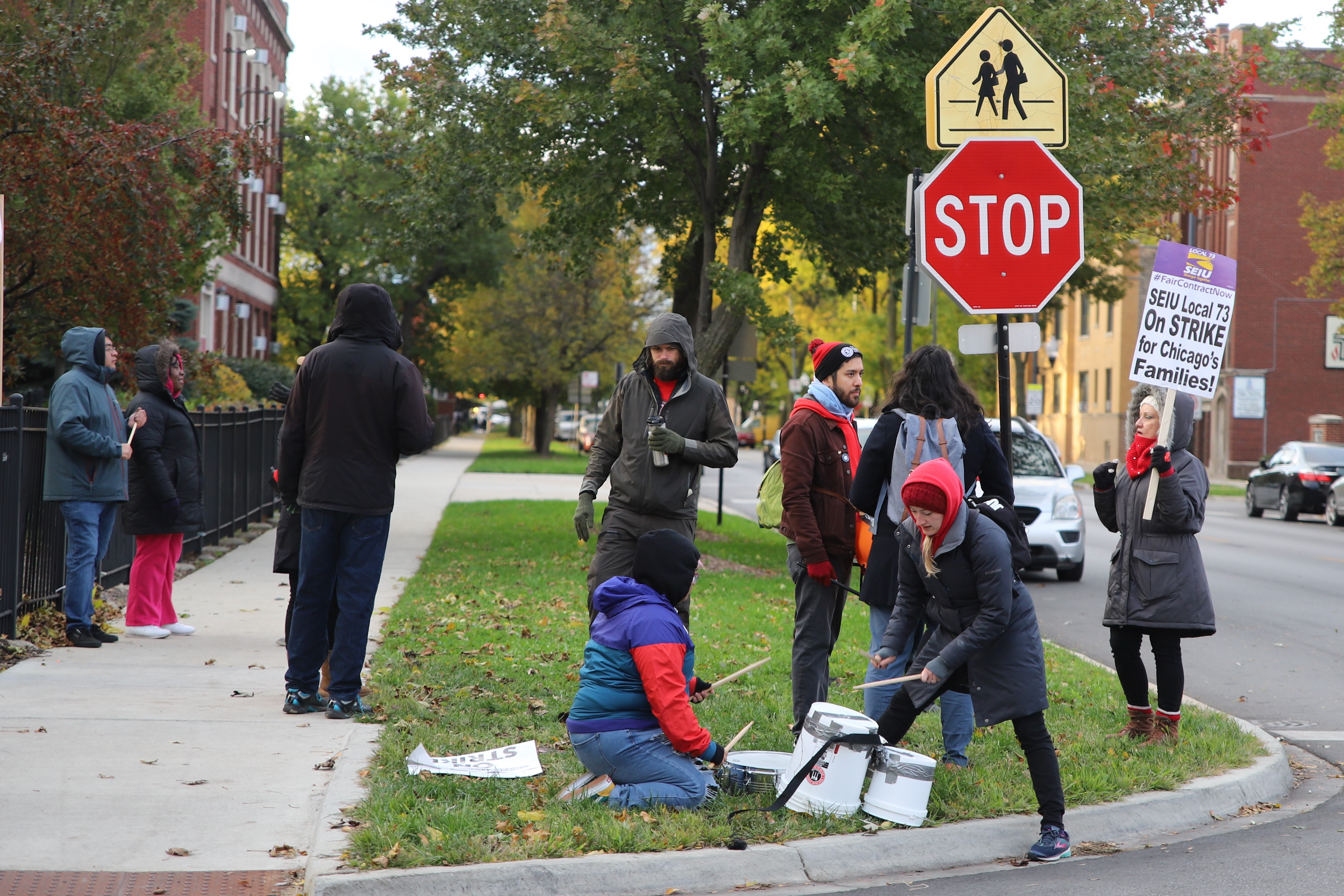
Strikers beat drums and hold signs at the corner of Wrightwood and Kostner avenues (Christopher Silber, 14 East)
Teachers, staff members and former students of Kelvyn Park High School stood at the corner of Wrightwood and Kostner avenues in Hermosa during Tuesday’s strike. They waved banners, played music over a speaker and set up a table with snacks as they caught the attention of passing cars. The earliest members arrived at 6:30 a.m., and by 7:30 the group swelled to about 30 people.
Those at the picket lines echoed concerns about the direction that negotiations were headed after CTU President Jesse Sharkey said Mayor Lori Lightfoot “dashed hopes” of a quick settlement last night by asking teachers to end the strike and return to their classrooms as negotiations continue.
“After the mayor said go back to work and we’ll negotiate while you work, we’re stalled out now,” said Stacy Hopp, the case manager at Kelvyn Park. “It’s an insult. She had months and months to work with us while we worked and she couldn’t do it, so we’re not going back.”
Hopp said Kelvyn Park faces many issues being addressed in current contract negotiations. She said the school has no librarian, staffs a psychologist one and a half days a week and has a nurse only one day a week.
“Our students come from situations where they need support, and they don’t have the social and emotional supports that they need.”
Hopp has been at Kelvyn Park for 13 years, and she also teaches three classes. She used to get an extra stipend for teaching classes as a case manager rather than a teacher, but this year she got no stipend, so she is teaching the classes unpaid.
Ninety-six percent of Kelvyn Park’s students are considered low-income, according to the Illinois State Board of Education. Demographically, most students are Latinx, as is the surrounding community of Hermosa. The school has a very high number of students learning English as a second language (ESL) relative to other CPS schools.
Ana Rodriguez, who teaches English and ESL, said the number of students learning English in the schools is increasing, partially due to an influx of refugee students.
“We’re getting a lot of refugees. We have students that came from Puerto Rico during the hurricane, Ecuador and Guatemala.”
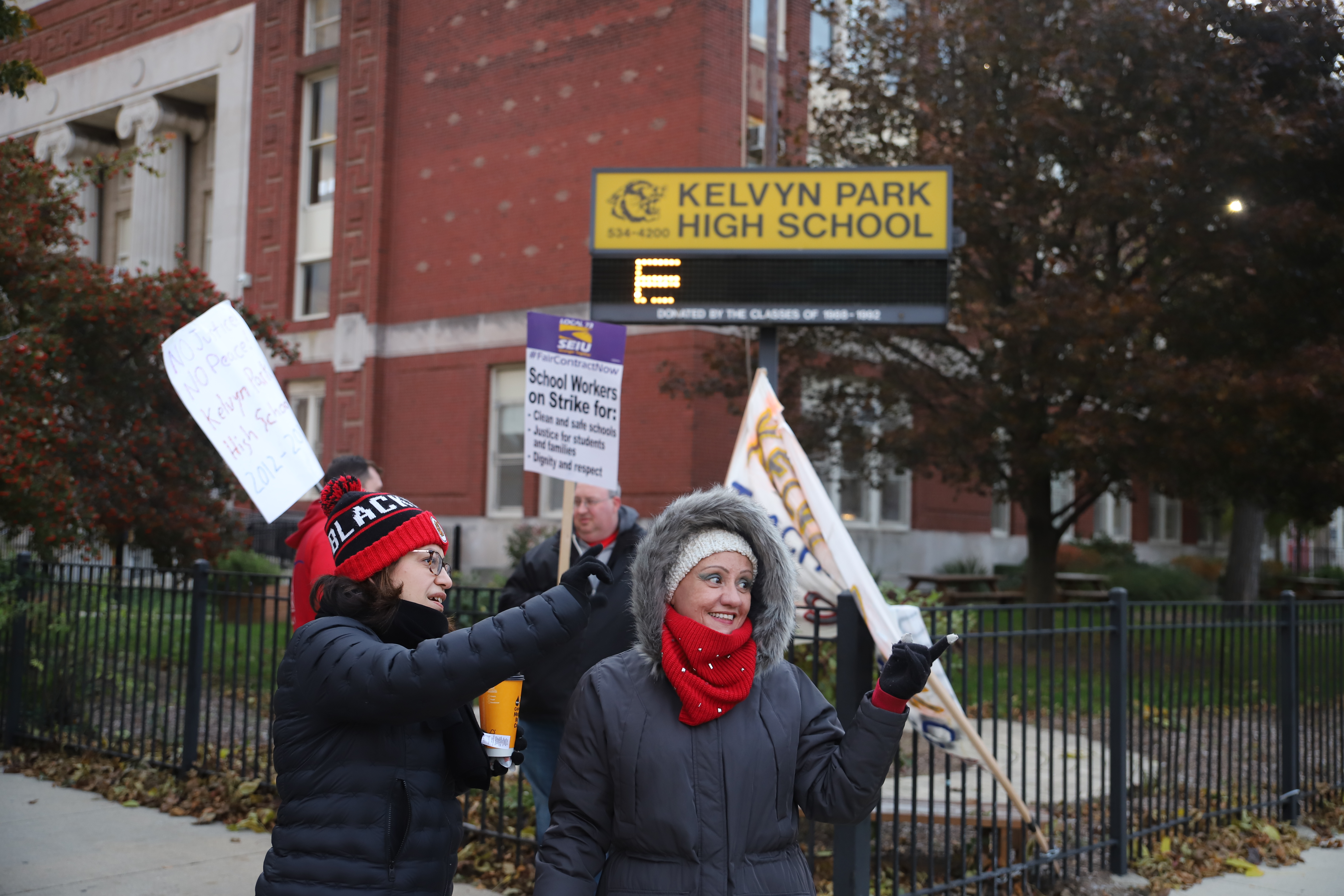
Rodriguez (left) joins the picketers in front of the high school (Christopher Silber, 14 East)
Rodriguez said large class sizes are an issue being discussed in negotiations that directly affects her teaching.
“It’s a difficult thing when you have 35 kids in a classroom that all have different needs – at least four different levels [of language comprehension] if not more.”
Staff also stressed difficulties at Kelvyn Park regarding reduced budgets due to decreasing enrollment. The school’s enrollment dropped 49 percent from 2014 to 2018, and now sits at 459 students.
“We’ve been basically gutted the past five to ten years,” said Andrew Iverson, who has been teaching at Kelvyn Park for twenty years. “We had close to 2,000 students when I first came here.”
Most passers-by on Tuesday morning honked or shouted in support of the strike. Noe Castro, 9th grade English and journalism teacher and Kelvyn Park’s union delegate, said as the strike continues, he fears the teachers may lose support.
“My biggest worry is that parents and families will start to see it as unnecessary,” Castro said. “I just hope everybody sticks with us and everybody can see this through.”
While the strike continues, Chicago public school buildings remain open for students to go in during the day and receive meals. School clerk Miryam Ramirez said that fewer students are going to the facility during the day as the strike continues.
“Yesterday we only had two students [come to the building]. On Friday we had about 20, and on the first day we had about 32 students,” said Ramirez.
Beyond Kelvyn Park, presidential candidate Elizabeth Warren made headlines attending the picket line at Oscar DePriest Elementary School in Austin. Warren, who used to be a public school teacher, has been vocal in her support for the CTU. She also released her new K-12 education plan on Monday.
As of 2:40 p.m., negotiations have resumed between the CTU and the city, though only the CTU’s union officers, not full bargaining team, is present. The CTU announced plans to strike through at least Thursday.
Day Five: Woodlawn Community Elementary School
October 21, 2019
Francesca Mathewes and Marissa Nelson reported from Woodlawn Community Elementary School on Monday morning.
After a weekend of negotiations, Chicago Teachers Union (CTU) members went back to their picket lines across the city on Monday morning. Meanwhile classes were canceled for the third day in a row, though the buildings are still open, offering breakfast and lunch at the school and dinner for students to take home.
An agreement has still not been reached between CTU and the city, although Mayor Lori Lightfoot responded to the continuation of the strike this morning by calling on teachers to return to school and end the strike while negotiations continue.
On Thursday, October 17, CTU members went on strike over contract negotiations for a variety of reasons — issues topping the list were overcrowded classes and a need for more support staff (including social workers, librarians and nurses in schools and lower caseloads for counselors). CTU members are also asking for paid prep time and affordable housing for students and their families.
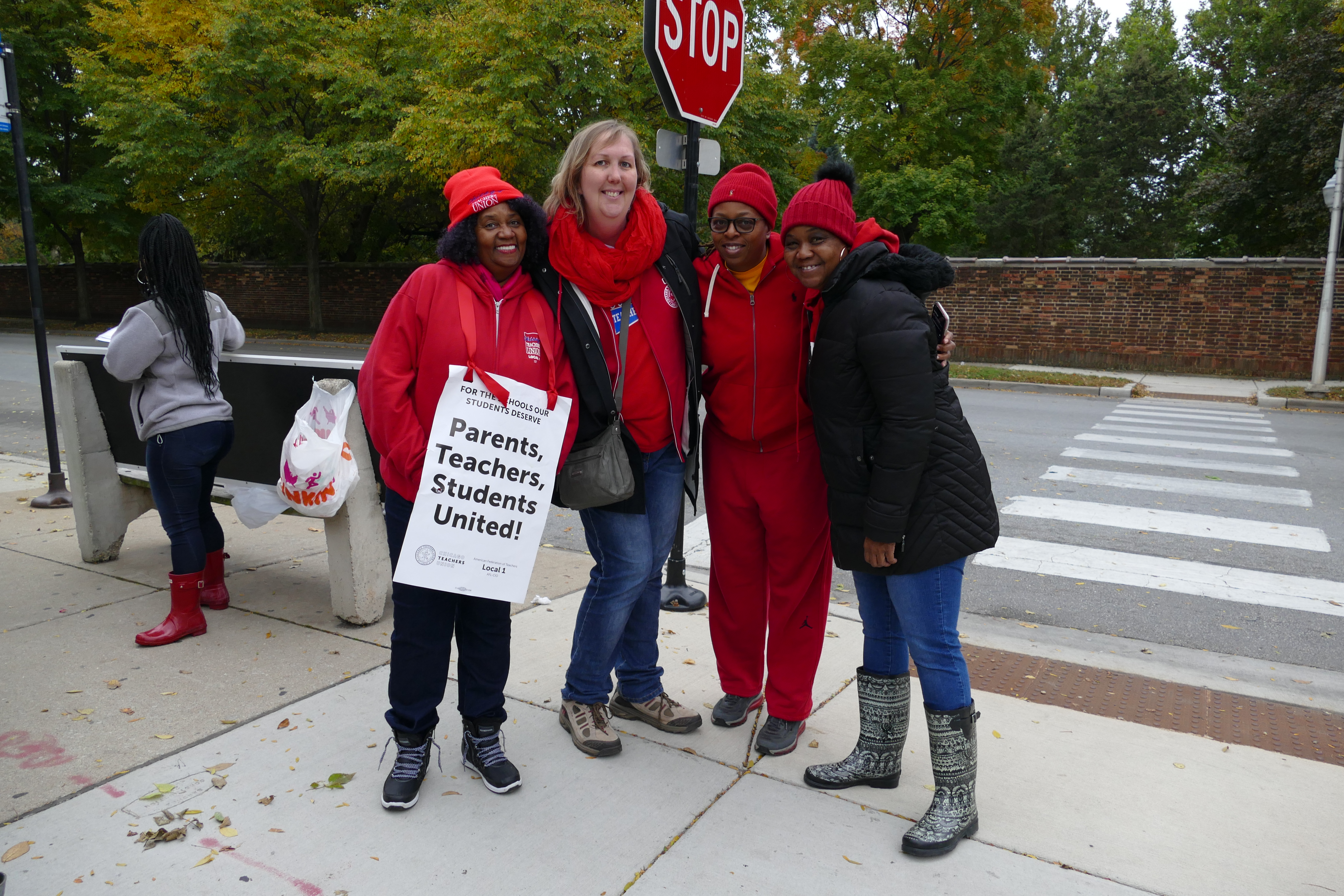
Educators at Woodlawn Community Elementary School at the picket line Monday morning. (Marissa Nelson, 14 East)On Monday morning at Woodlawn Community Elementary School, a group of about ten educators stood outside the school building in the rain. Cars and buses honked in a near constant stream as the strikers, adorned in red, held signs and waved from the sidewalk.
Educators at the Woodlawn school discussed inequity and lack of services in the school system as the main focus points of the strike.
“We’re fighting for more than money. It’s for services. Chicago is one of the most segregated cities in the country. You’ve got some neighborhoods that have all of these services, parks, everything. But on the South and West sides, it’s disparity,” said Renee Salahuddin, a teacher at Woodlawn Community School.
Salahuddin talked about the mental, emotional and sometimes medical support that teachers in understaffed and under-resourced schools often have to provide to help students get through the day.
“I can’t be a psychologist, I can’t be a doctor or a nurse. I’m supposed to be teaching. I have to run around and find kids’ asthma medicine –– ‘two pumps please!’ –– I have to get training on that in addition to all of the other things we have to do,” she said. “Can you imagine you’re having to do that before you can even teach? Calm someone down because they didn’t get any counseling about [trauma regarding] a parent or family member? We have to build that into curriculum. It’s really a lot, psychologically, and would you expect that of any other job?”
Jennifer Hartsig, also a CPS educator, emphasized that the strike is about more than increased pay. Resources, better staffing and more systemic changes such as public housing reform are also a part of the platform for this strike.
“In the last couple of contracts there were so many promises made that were rescinded. We’re just tired of having that happen,” Hartsig said. “We’re looking to have a fair, ethical contract for everyone involved: parents, teachers, children.”
As the strike continues through today and negotiations continue, Hartsig is prepared to handle pushback head on.
“We’ll continue to explain it’s for the children and what they need,” she said.
Day Two and into the Weekend: Negotiations Continue
October 18-20
CPS and city officials continued negotiating on Friday and through the weekend. Meanwhile CTU members continued at their picket lines on Friday and rallied with healthcare workers on Saturday. Though CTU negotiators say progress was made, both sides did not come to an agreement that would end the strike.
Janice Jackson, the CEO of CPS, explained the current offer to parents in a letter on Sunday, according to CBS.
“Under our current offer, an average teacher will see their salary rise to nearly $100,000,” Jackson wrote. “Critical support staff such as clerks, nurses, and teacher assistants will receive raises exceeding 20 percent over five years, and many will see their paychecks rise 7 to 14 percent immediately.”
Jackson also addressed concerns regarding class size and staffing.
“Our class size offer would allocate over $10 million to support additional staffing for the relatively small number of overcrowded classrooms in the district, and our staffing proposal would go above and beyond the public commitment Mayor Lightfoot and I made over the summer to hire hundreds of additional social workers, nurses and special education case managers. Through both of these proposals, we have worked to create solutions that will promote equity and ensure resources are directed to the schools that need them most.”
Among negotiation accomplishments, CTU representatives said in a press conference on Sunday night that, among other things, CPS has agreed to require that school counselors are assigned counseling work. Previously, school counselors reported being pulled into other administrative duties such as testing. Students experiencing homelessness will also be connected with a person dedicated to helping them “transition and be successful.”
However, negotiations were held up yet again on issues regarding class size and support staffing. Mayor Lori Lightfood and Jackson said CTU moved slowly during negotiations and counterproposals on these issues. The union said delays were due to a lack of enforcement mechanisms in the contract that would ensure the promises are kept.
Day One: Wendell Phillips Academy High School
October 17, 2019
Marissa Nelson reported from Wendell Phillips Academy High School on Thursday morning — she tweeted live from the picket line while speaking with Chicago Public Schools educators on strike.
Check out her Twitter coverage and read her full story about the Phillips educators’ first day on strike. Below is a brief recap and record the people involved in the strike.
Chicago Teachers Union members went on strike on Thursday, October 17. Educators across the city arrived at their school’s picket lines in the morning, protesting for four hours (from 6:30 a.m. to around 10:30 a.m.) Then they headed downtown for a rally and march at the intersection of Madison and Dearborn streets.
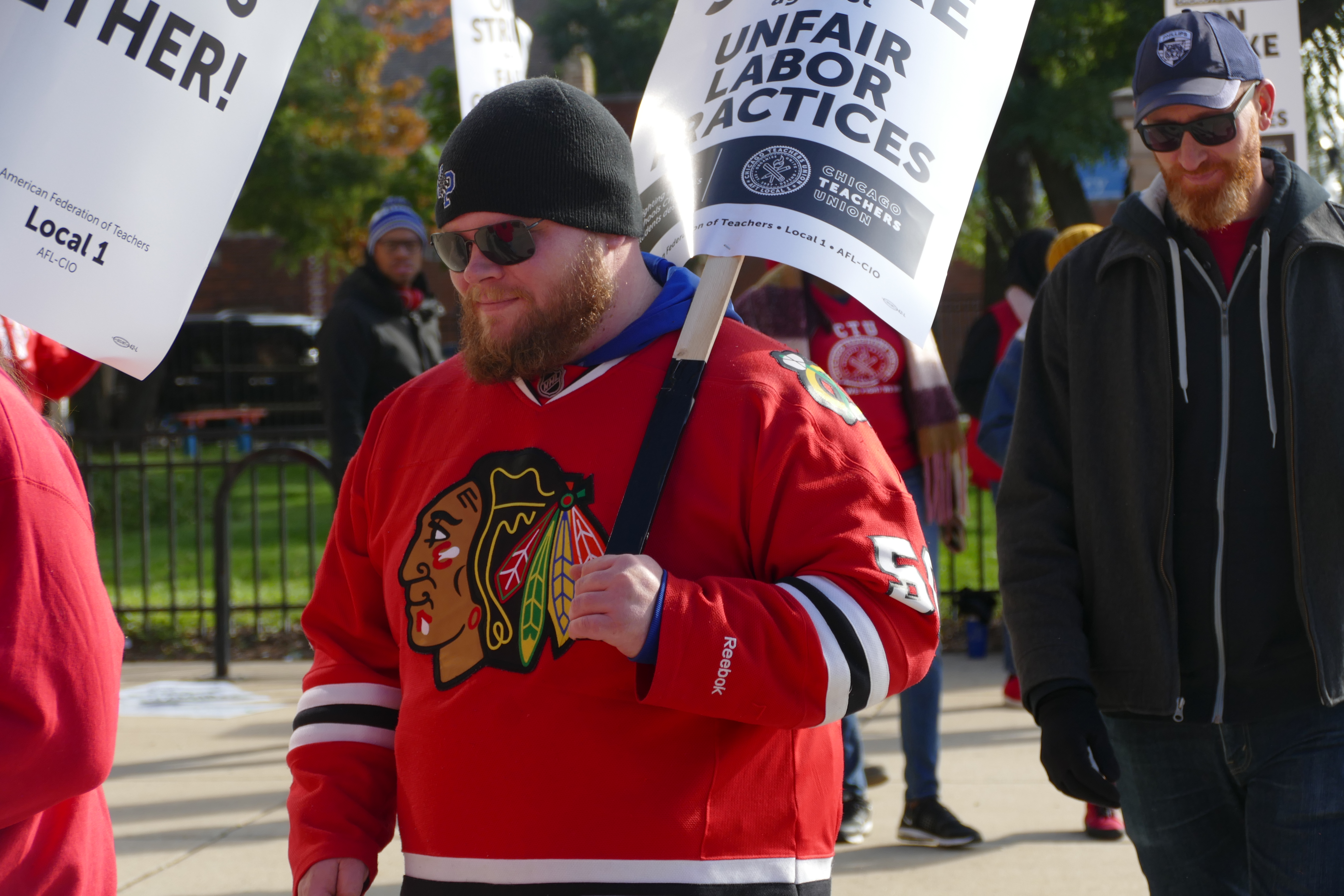
Hendrickson marching at the picket line. (Marissa Nelson, 14 East)
At Wendell Phillips Academy High School in Bronzeville, over 50 educators gathered. They brought premade signs and sharpies to create their own. The educators overwhelmingly expressed that they were on strike for their students.
“There are students that don’t have a problem accessing things like library and school support staff, and it seems to be that the schools where they do have those issues are all in the poorer neighborhoods,” said William Hendrickson, a civics teacher at Wendell Phillips. “If we are going to be a city, if we are all going to be in the same boat, we should be working toward eliminating the inequity as opposed to throwing our hands up and saying that is how it is.”
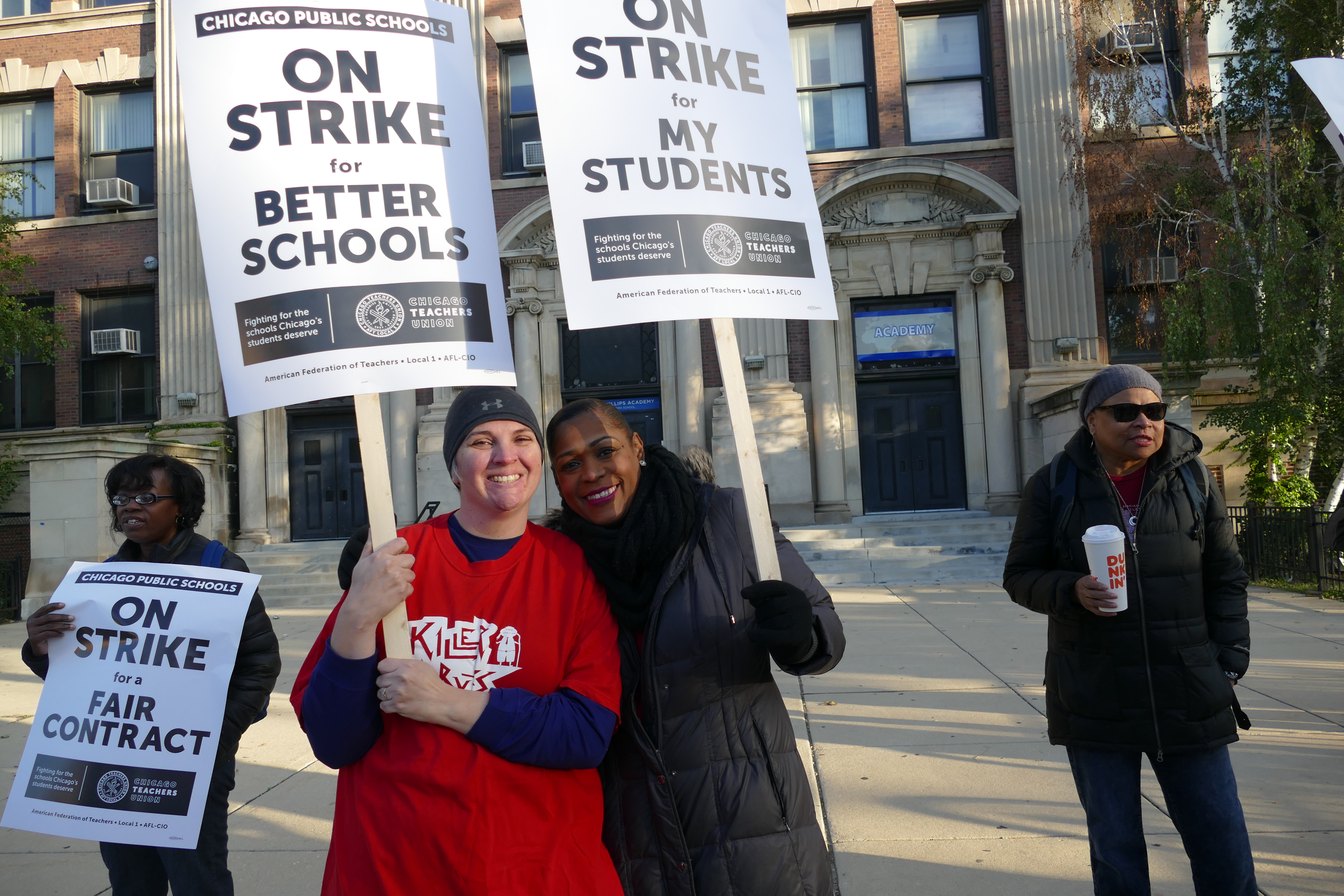
Premarathna (left) and Vines (right) at Phillips Academy on the first day of the strike. (Marissa Nelson, 14 East)
“I am so proud. I feel like to support and stand for teachers was incredible, but to actually be a teacher is even more incredible,” said Monique Coleman Vines, a first year special education teacher and recent DePaul graduate. Seven years ago, while working in marketing, Vines supported the teachers from the sidelines the last time they went on strike. This year she was at the picket line. “For me to be part of the CTU, it makes me believe there is something bigger than myself.”
“The reason I’m here is the reason, I’m being a teacher,” said science teacher Stefanie Premarathna. “I want to help my students. I want them to get the best that they can get and right now they’re not getting it and that’s a shame because they deserve it.”
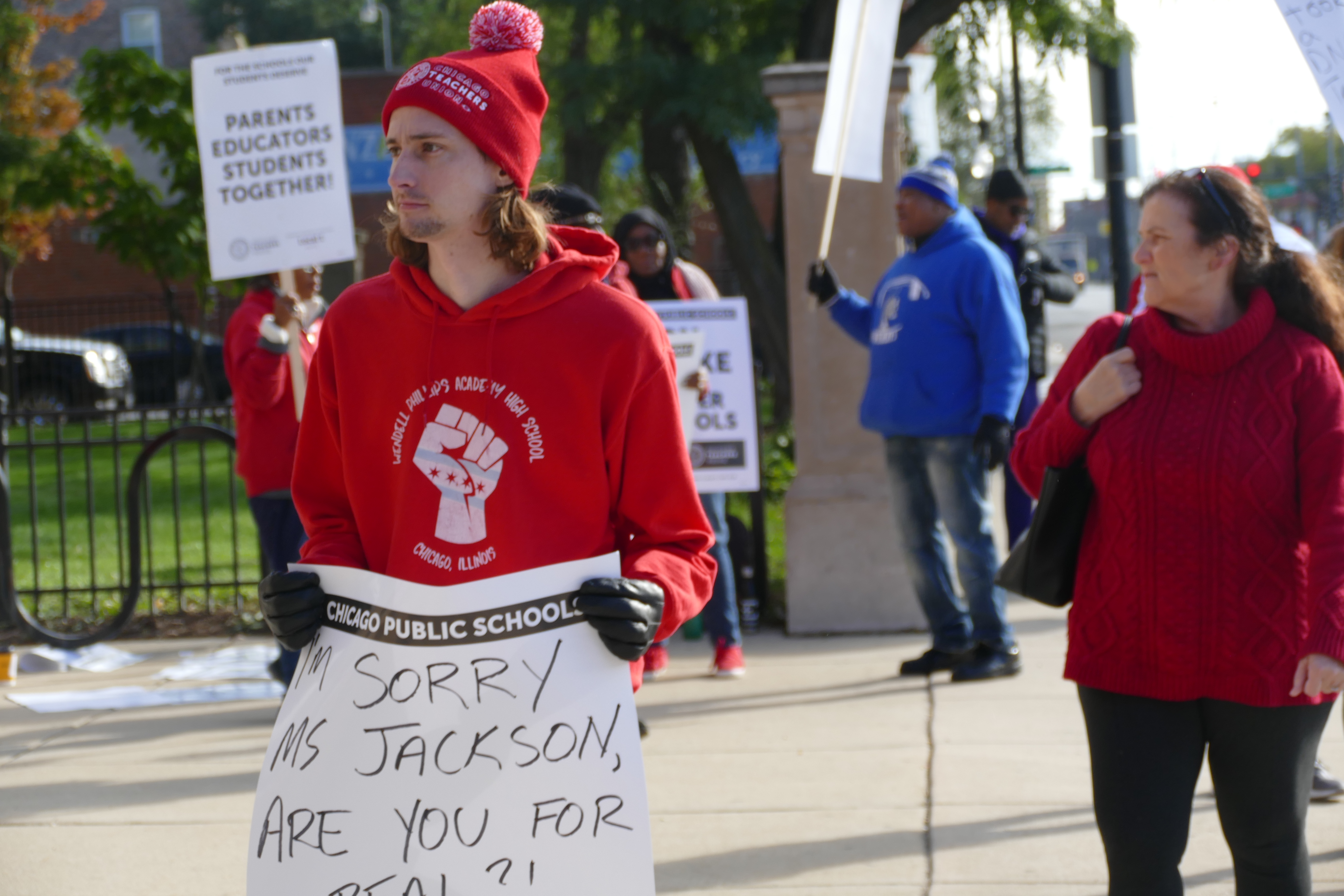
Wilson at Phillips’ picket line. (Marissa Nelson, 14 East)
“Chicago is really two cities and the disparities that exist are magnified within our school system and I think we see those really clearly and really well,” said science teacher David Wilson. “We have to see them and deal with them every day here at Phillips. There’s a long list of issues, I think this year we’re focusing on things like class size and getting nurses for our students to take care of their health when they’re here and to get a social worker.”
Header photo by Chris Silber, 14 East
An earlier version of the story misspelled Shavona McGregor’s name. A change has been made to reflect this.




A Decade in Review: How Technology Developments Impact Classrooms – Fourteen East
20 December
[…] recently, these issues as they related to school staffing were manifested in the 2019 Chicago Teachers Union (CTU) strike. Back in 2012, a similar strike took place. However, unlike the 2019 one, the 2012 […]